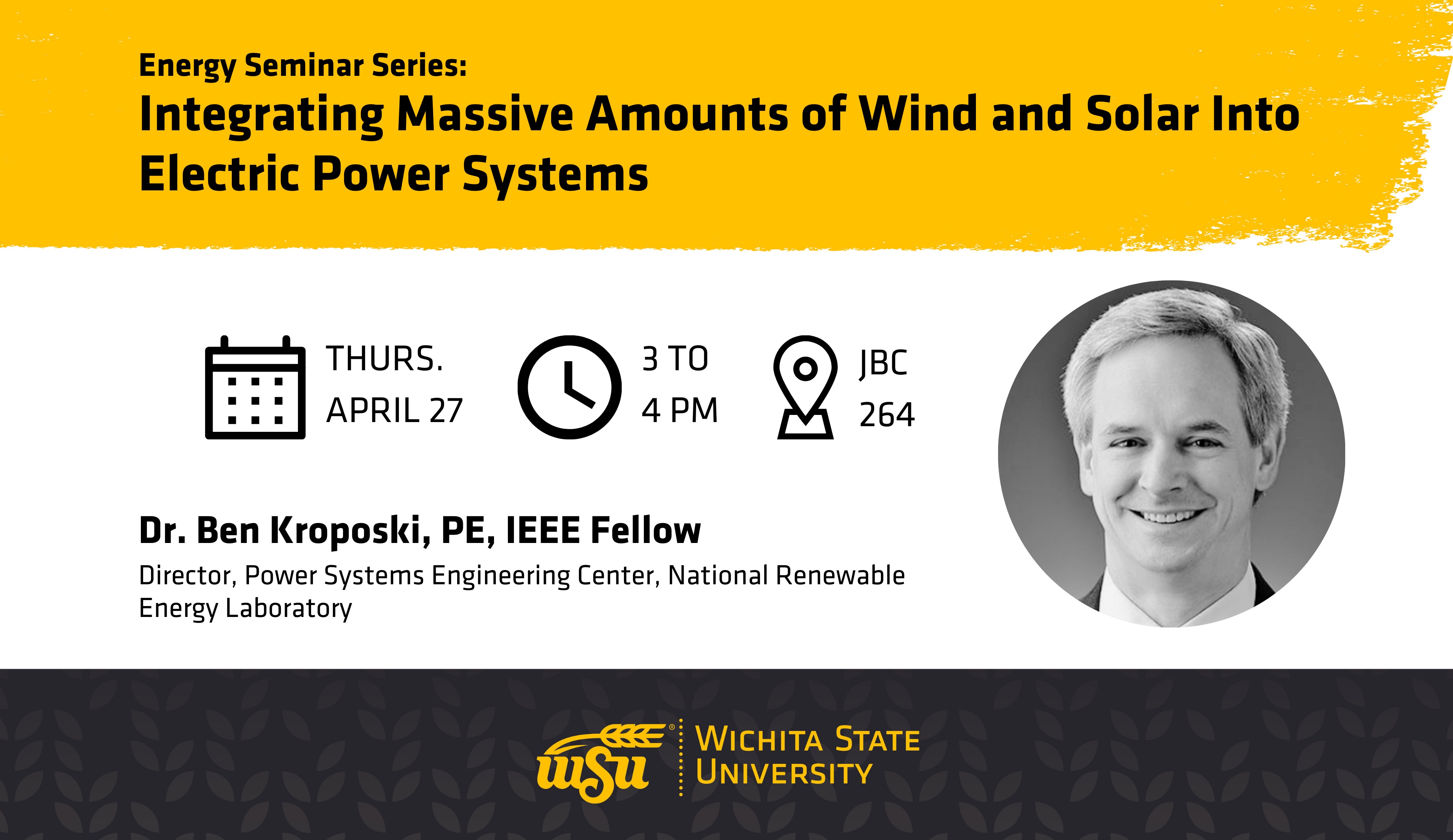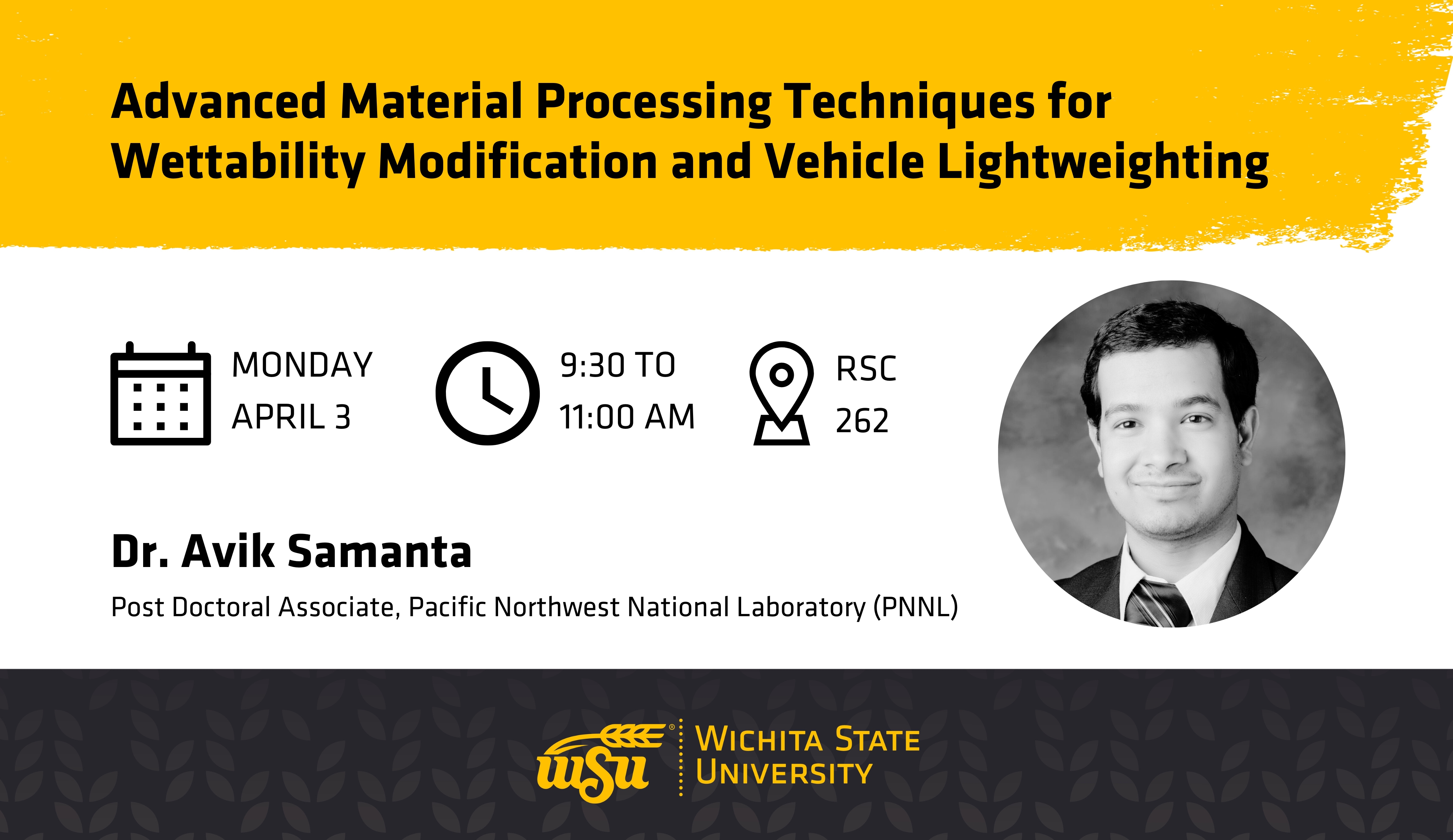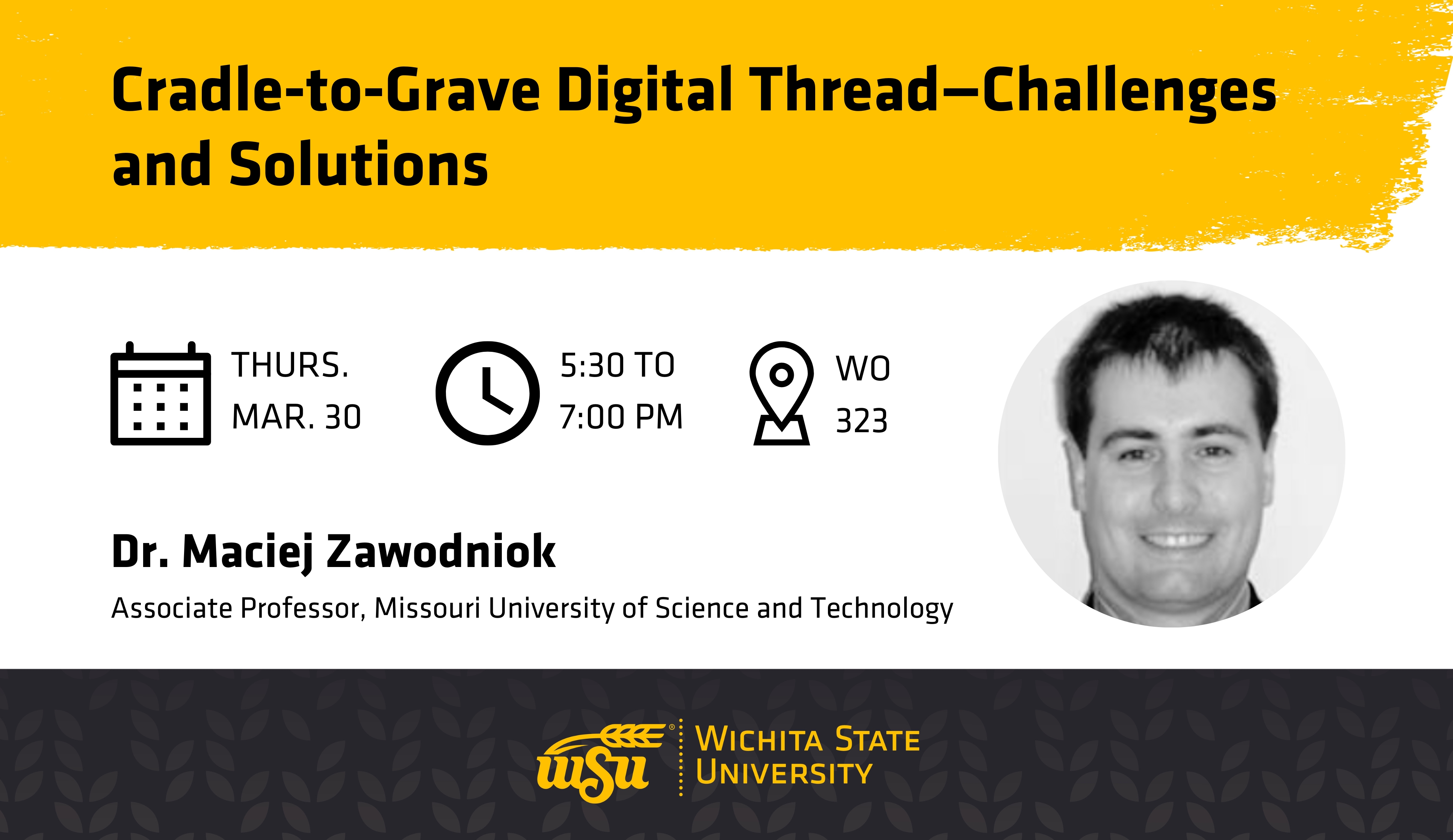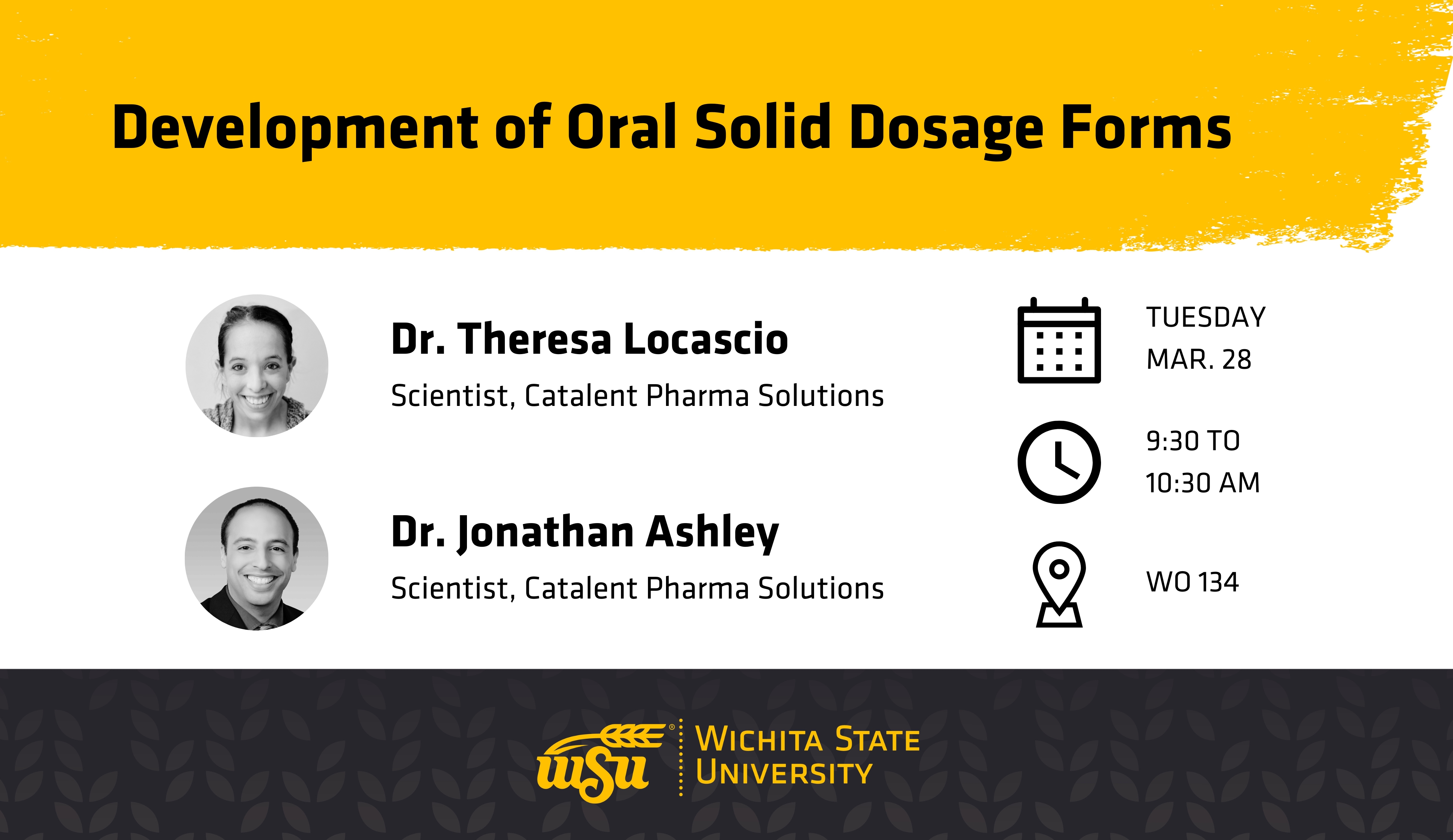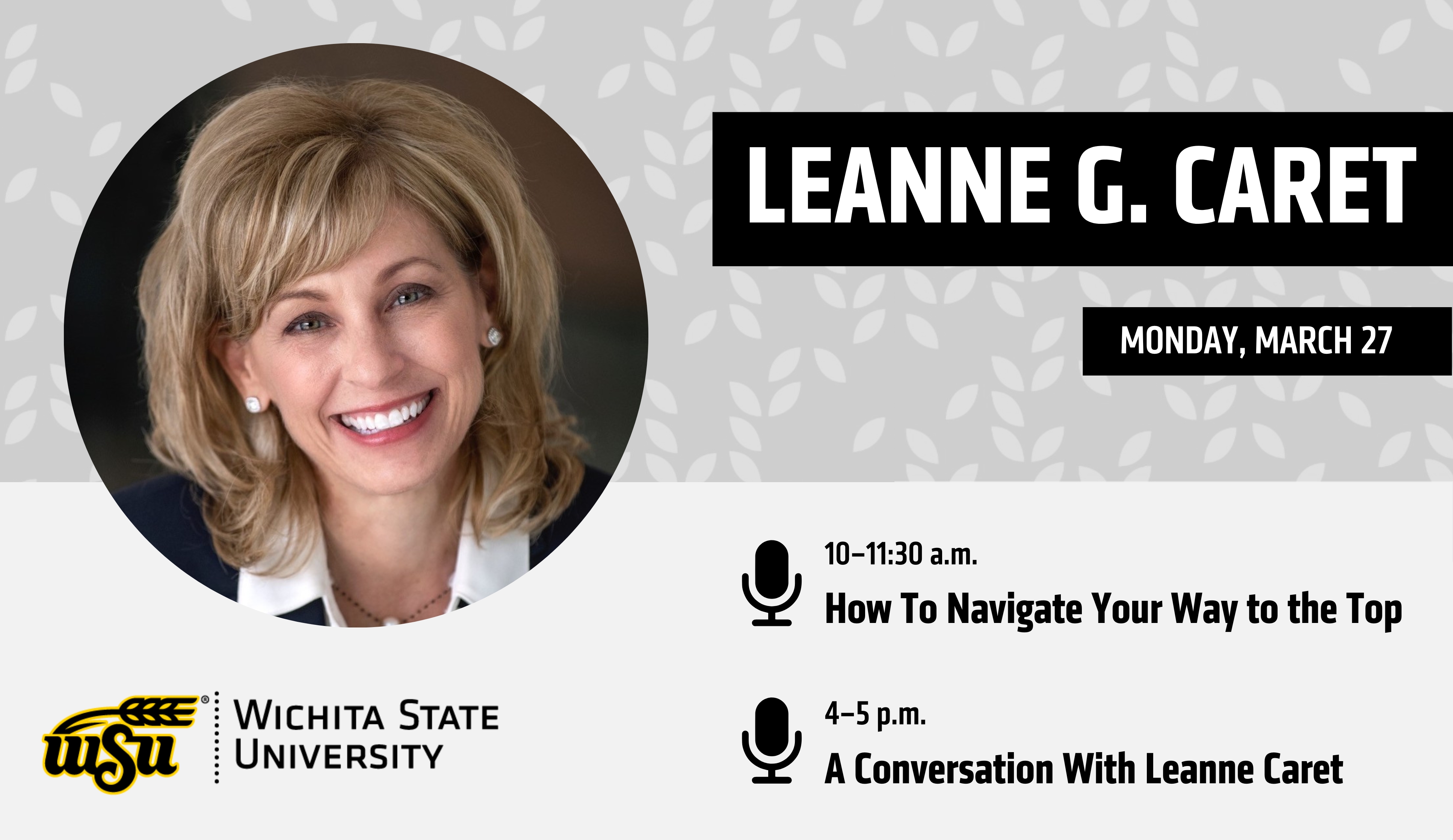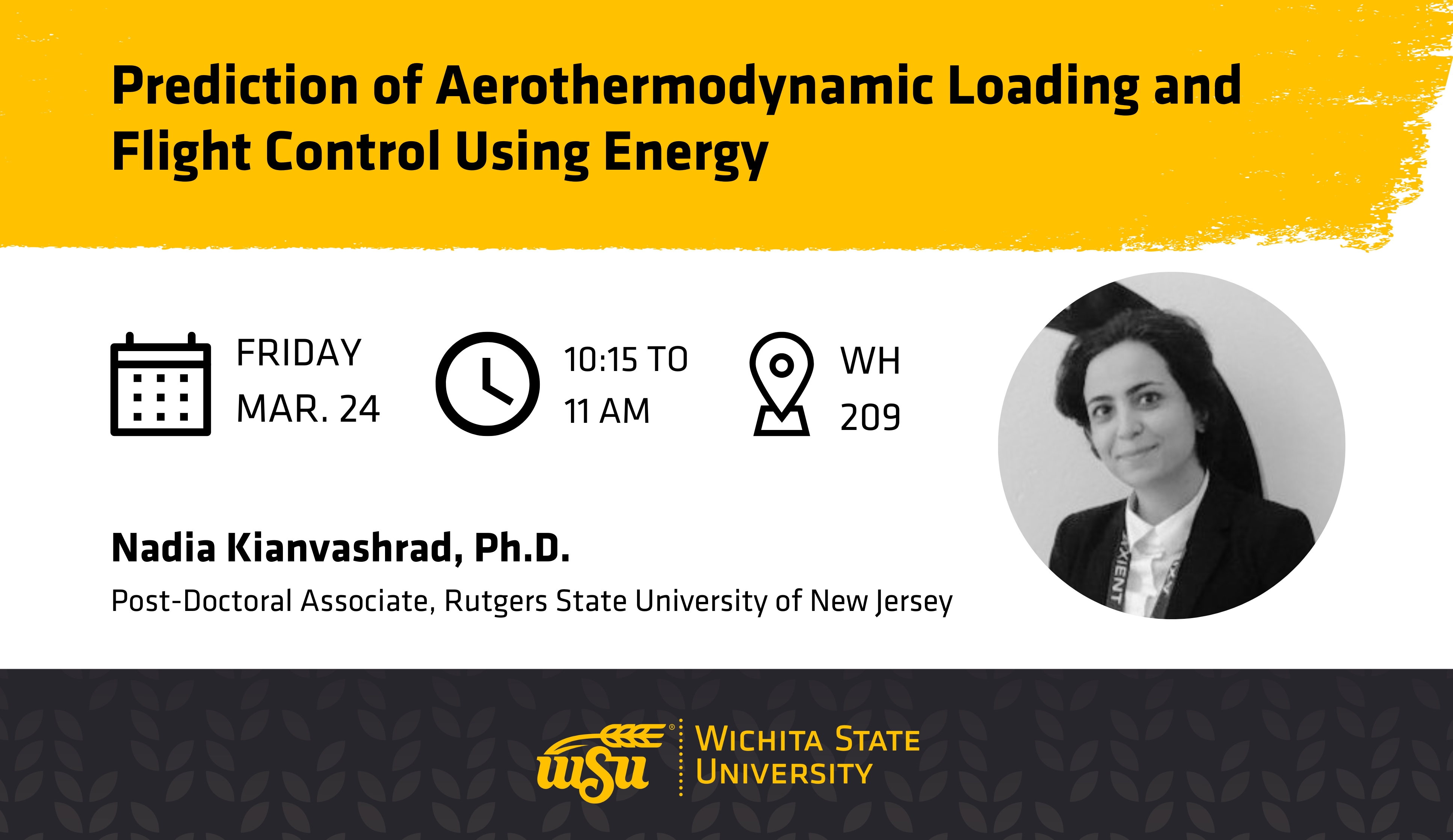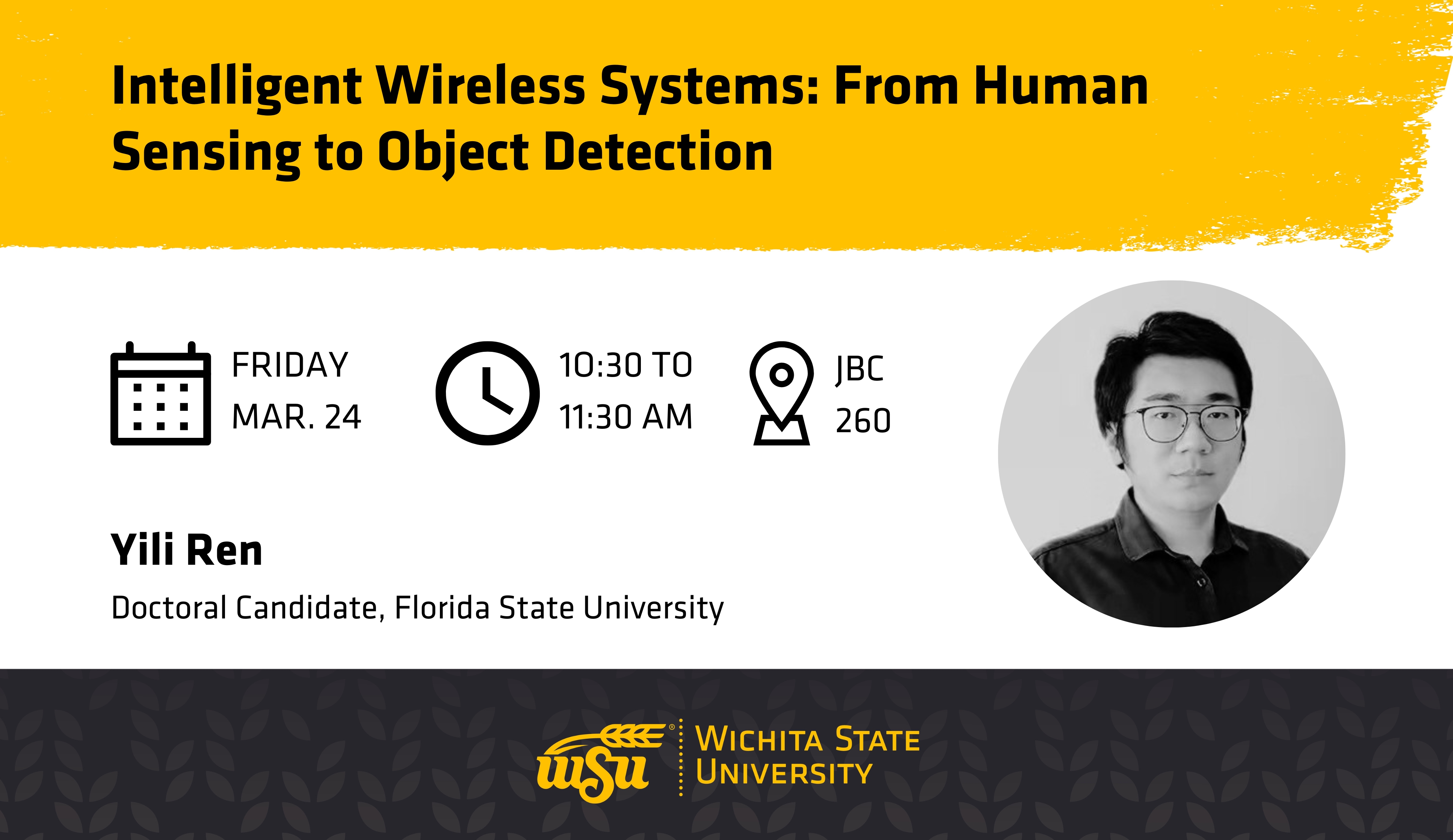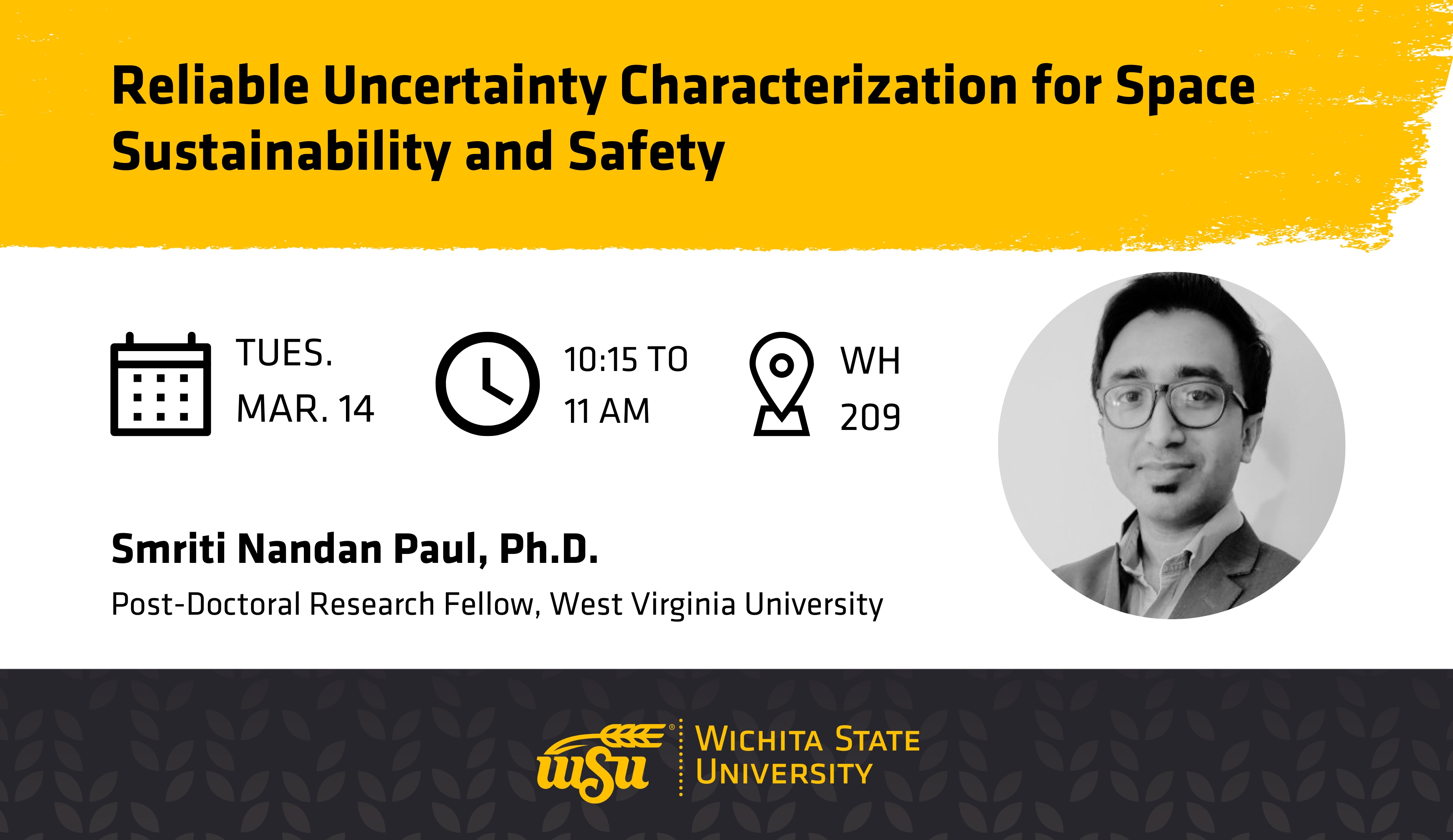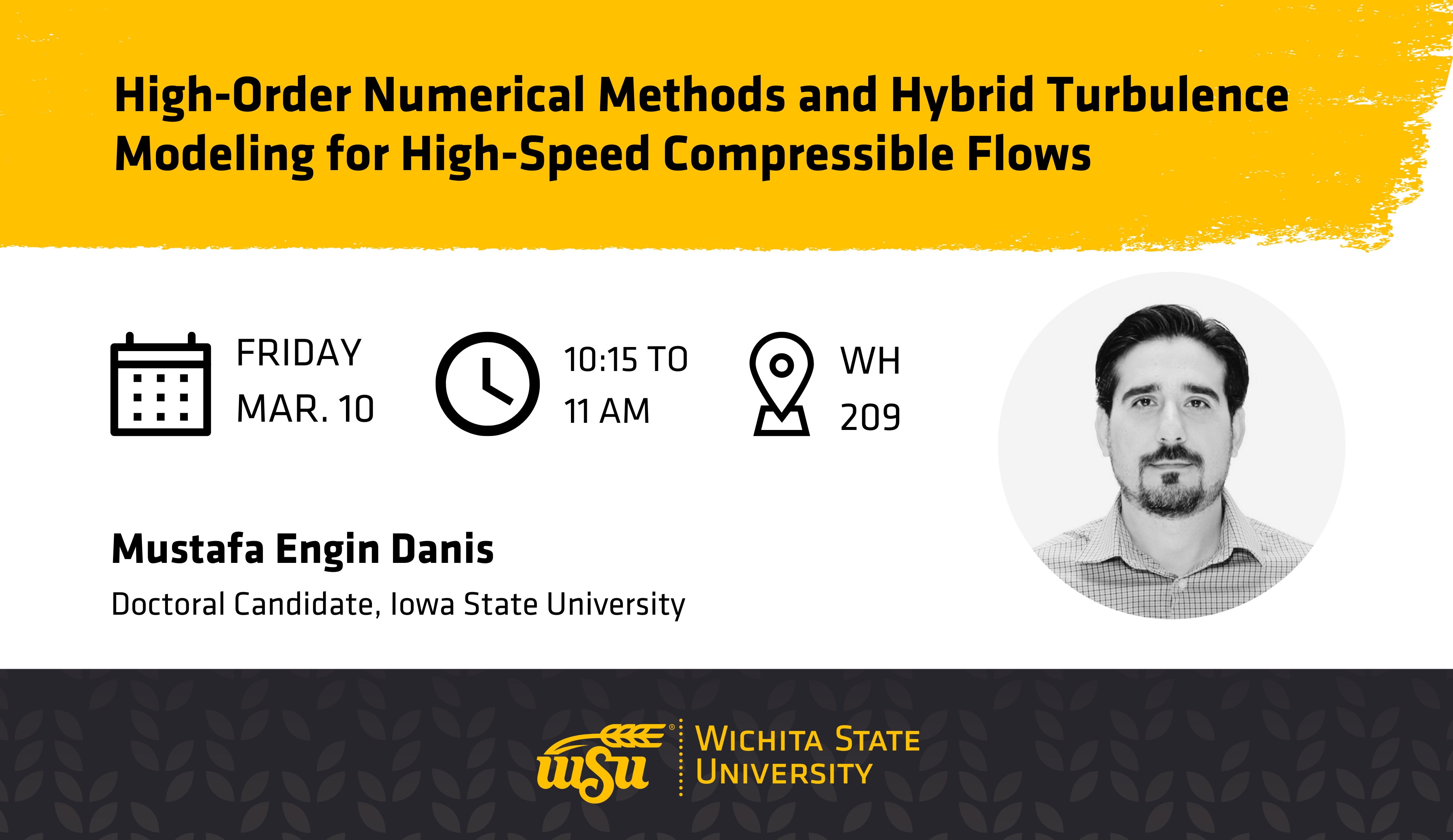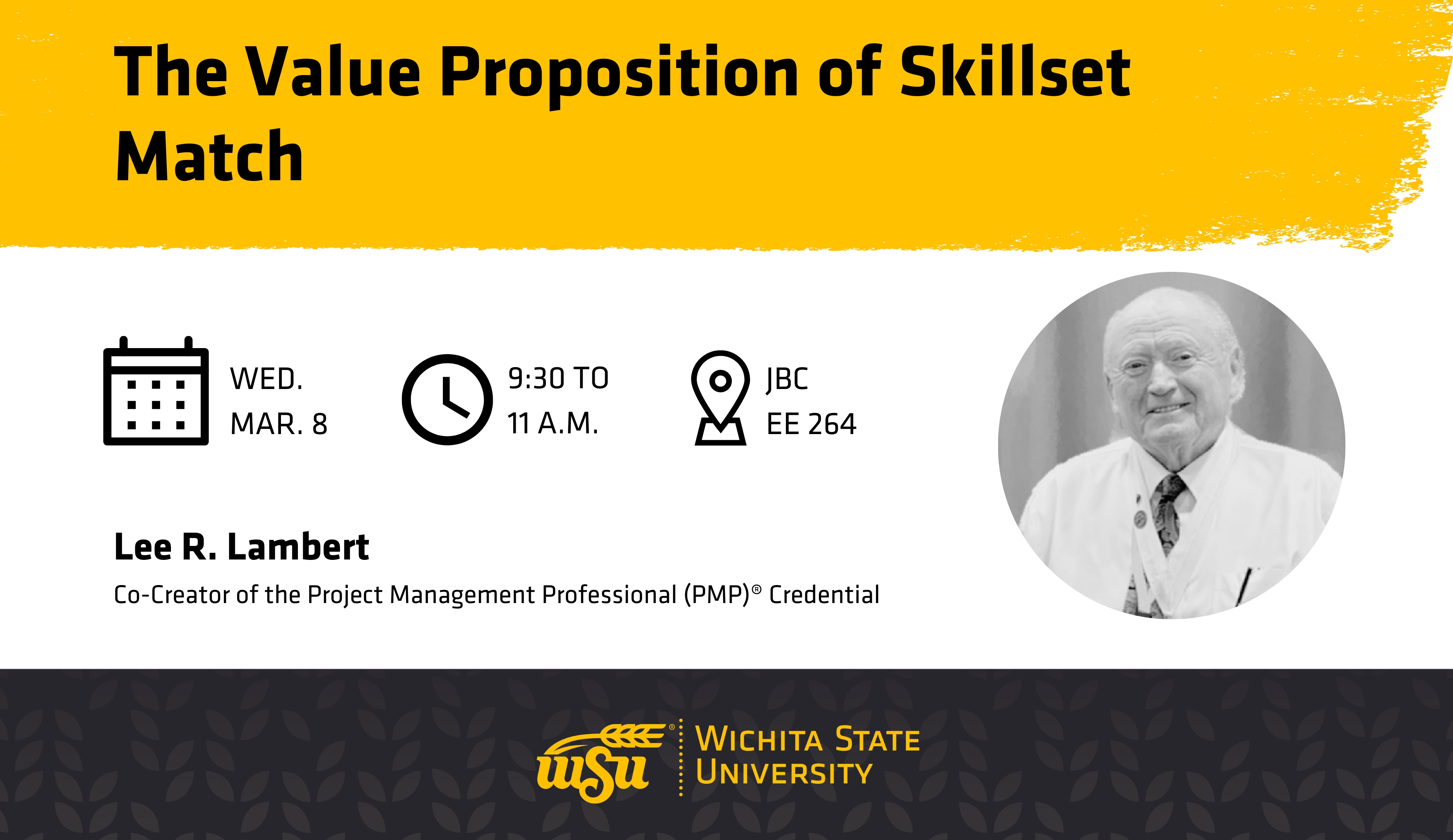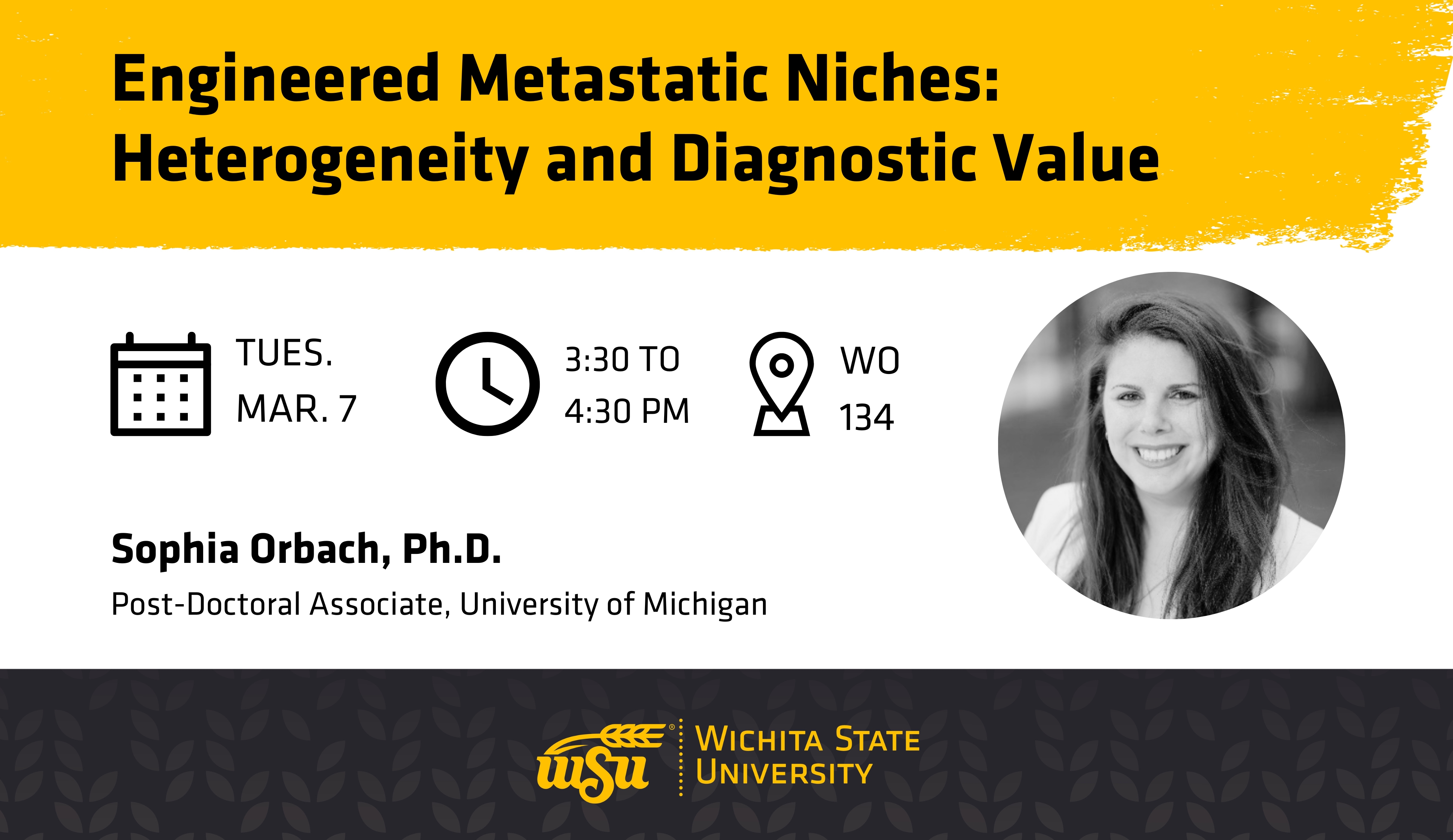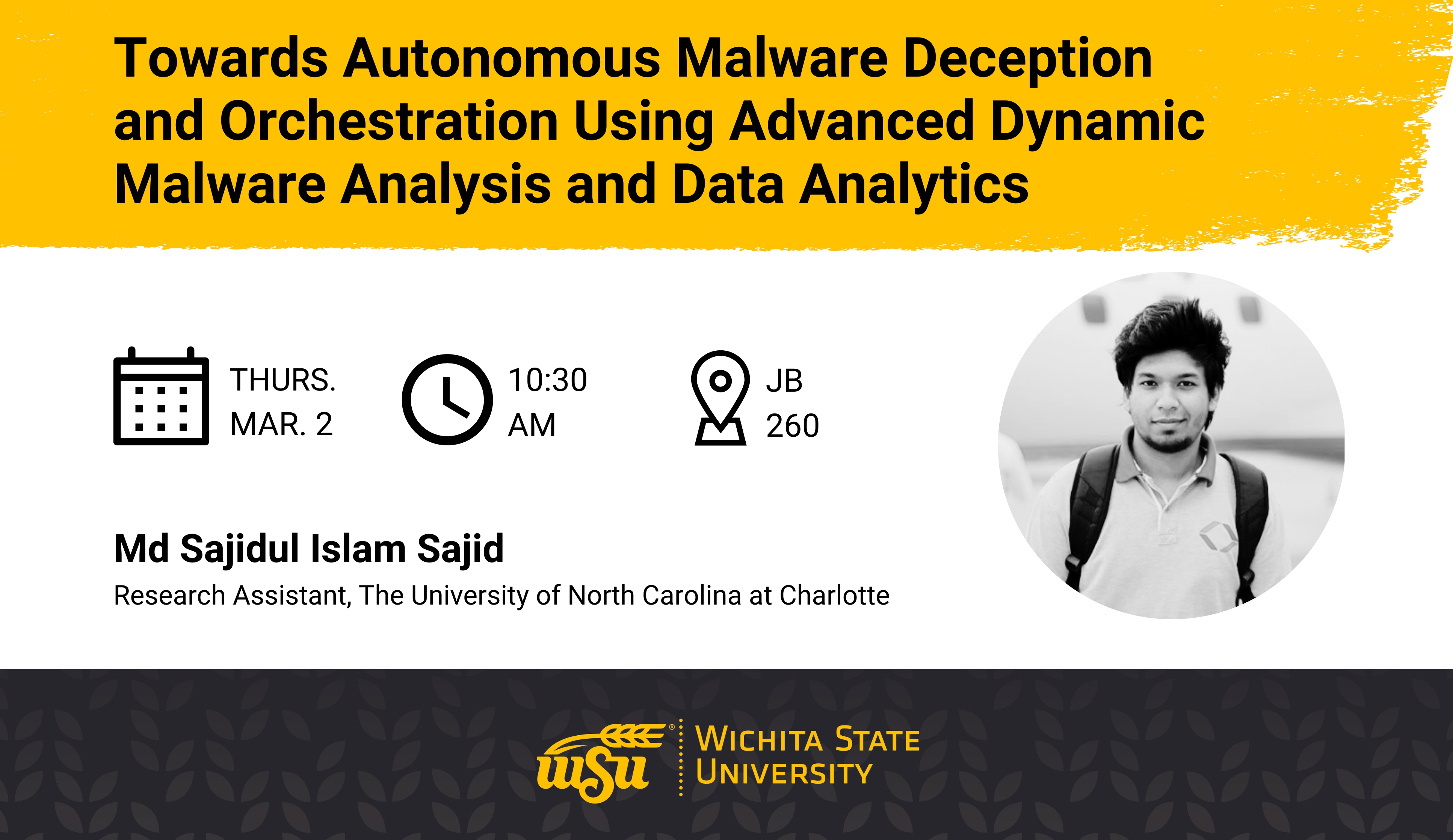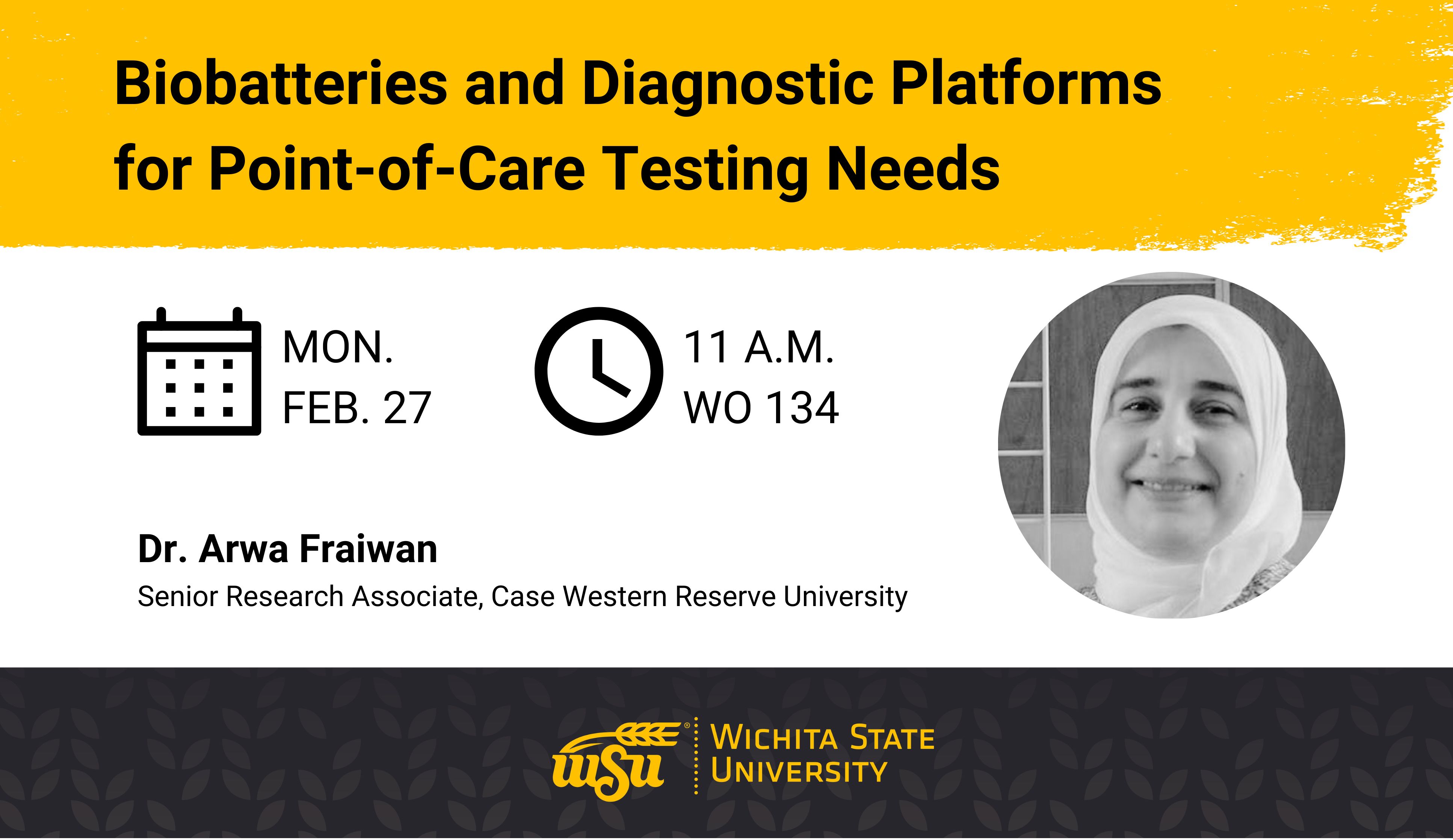Attend an Upcoming Speaking Event
The College of Engineering regularly hosts various speaking events, including featured or keynote speakers, seminars about departmental topics and question/answer sessions with industry leaders. We encourage you to learn more about our past or upcoming speaking events.
Upcoming Speaking Events
There are no upcoming speaking events scheduled at this time, but please check back
soon.
Past 2025 Speaking Events
Time: 5:30 pm
Location: Woolsey Hall, Fidelity Bank Ballroom
Featured Speaker: Alejandra Campoverdi, the best-selling author of the award-winning memoir, "FIRST GEN"
Attendees: All Wichita State University students, staff, faculty, alumni and industry partners are invited to attend.
Human Factors Tea Time
Time: 12:30 to 1:30 pm
Location: McKinley Hall, Room 102
Featured Speaker: Dr. Yuanyuan Gao, Assistant Professor, Biomedical Engineering, College of Engineering, Wichita State University
Attendees: All Wichita State University students, staff, faculty, alumni and industry partners are invited to attend.
Description: Neuroimaging is a powerful tool for understanding brain function, neuroergonomics and clinical disorders. Dr. Gao’s presentation will introduce functional neuroimaging technologies, discuss best practices for designing a functional neuroimaging study and highlight available campus resources to support collaborative neuroimaging studies.
Guaranteed Resilience of Uncertain Autonomous Systems
Time: 10 to 11 am
Location: Wallace Hall, Room 209
Featured Speaker: Dr. Melkior Ornik, Assistant Professor, Department of Aerospace Engineering, University of Illinois Urbana-Champaign
Attendees: All Wichita State University students, staff, faculty, alumni and industry partners are invited to attend.
Abstract: The development of high-level autonomy, necessarily requiring real-time adaptation to significant adverse events, faces a critical conceptual challenge: if the controller has no system model following the adversity, and no prior opportunity to collect data, how can we form meaningful guarantees about system behavior? In fact, how do we know whether the system's task is still feasible? Indeed, an intelligent planner should quickly understand which tasks can certifiably be completed given the limited current knowledge, and then formulate appropriate control laws. To move towards that goal, in this talk I will present an emergent twin efforts of design-time guaranteed resilience and mission-time guaranteed performance. These approaches compute a set of tasks completable under all system dynamics consistent with the planner's partial knowledge, provide bounds on the time and energy required to complete the tasks, and synthesize appropriate policies using online learning and adaptation. In describing this framework, this talk will briefly present several applications to aerial vehicles, identifying promising future directions of research such as planning for complex tasks, verifiable performance with faulty sensing, and data-driven incremental certification.
Biography: Melkior Ornik is an assistant professor in the Department of Aerospace Engineering at the University of Illinois Urbana-Champaign, also affiliated with the Coordinated Science Laboratory, as well as the Discovery Partners Institute in Chicago. He received his Ph.D. degree from the University of Toronto in 2017. His research focuses on developing theory and algorithms for control, learning and task planning in autonomous systems that operate in uncertain, changing, or adversarial environments, as well as in scenarios where only limited knowledge of the system is available. He is a senior member of AIAA and IEEE, his recent work has been extensively funded by NASA grants and Department of Defense programs. He has been awarded the 2023 Air Force Young Investigator Program award, and recently selected for the 2025 Office of Naval Research Young Investigator Program award.
Past 2024 Speaking Events
Translational Biomaterials for Cartilage and Spinal Cord Repair
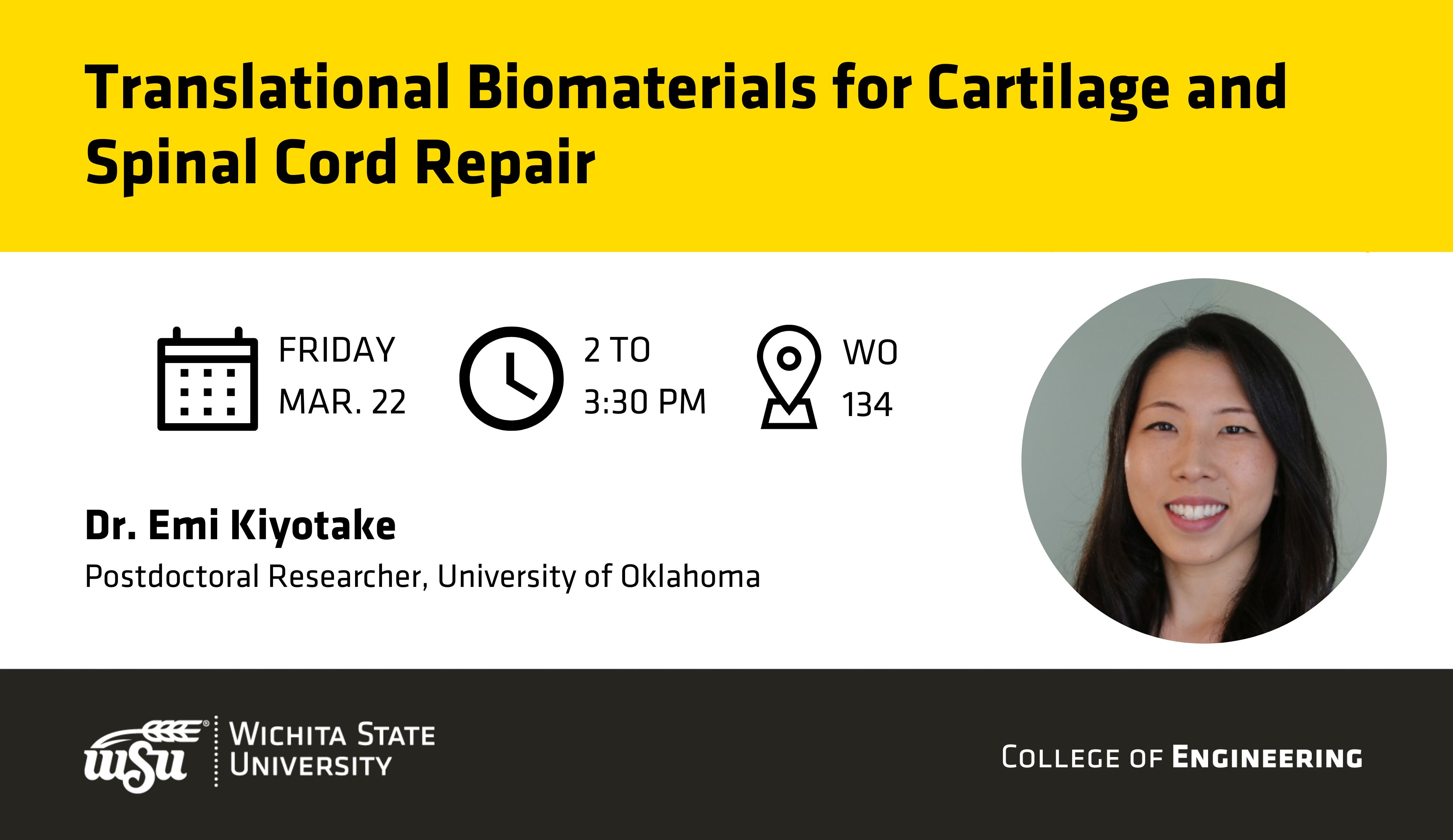
Time: Lecture from 2 to 3 pm, followed by refreshments and networking from 3 to 3:30 pm
Location: Woolsey Hall, Room 134
Featured Speaker: Dr. Emi Kiyotake, Postdoctoral Researcher, University of Oklahoma
Attendees: All Wichita State University students, staff, faculty, alumni and industry partners are invited to attend.
Refreshments: Light refreshments will be served.
Experimental Investigation of Propeller Aerodynamics for Multi-Rotor Vehicle Applications and the Vision of Connecting Wind Tunnel Testing with Flight Test for Rotorcraft Research
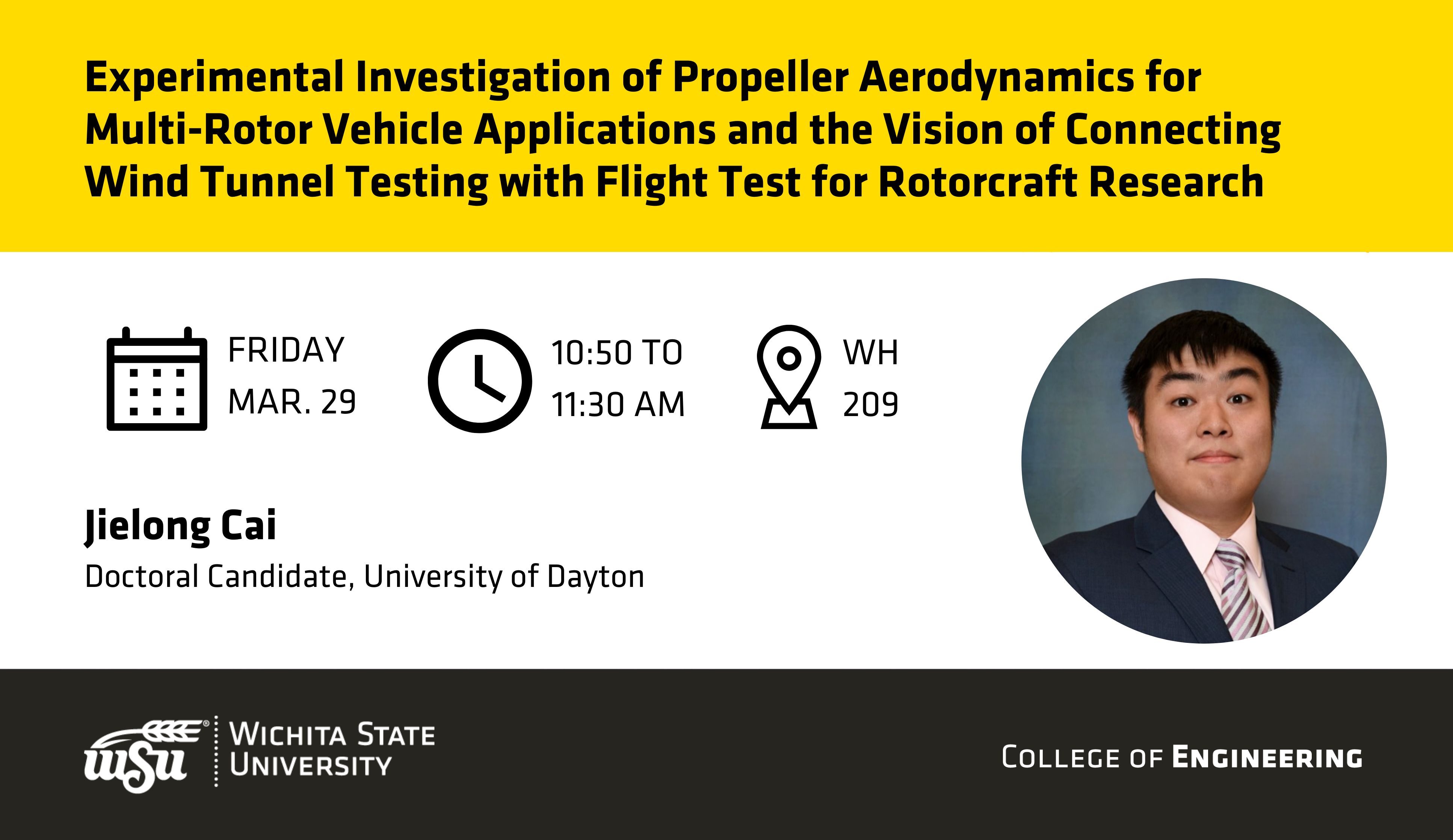
Time: Lecture from 10:50 to 11:30 AM
Location: Wallace Hall, Room 209
Featured Speaker: Jielong Cai, Doctoral Canidate, University of Dayton
Attendees: All Wichita State University students, staff, faculty, alumni and industry partners are invited to attend.
A Synergistic Approach to Interdisciplinary Research in Complex Dynamical Systems and Control: Case Studies on Helicopter Shipboard Landings and Floating Offshore Wind Turbines
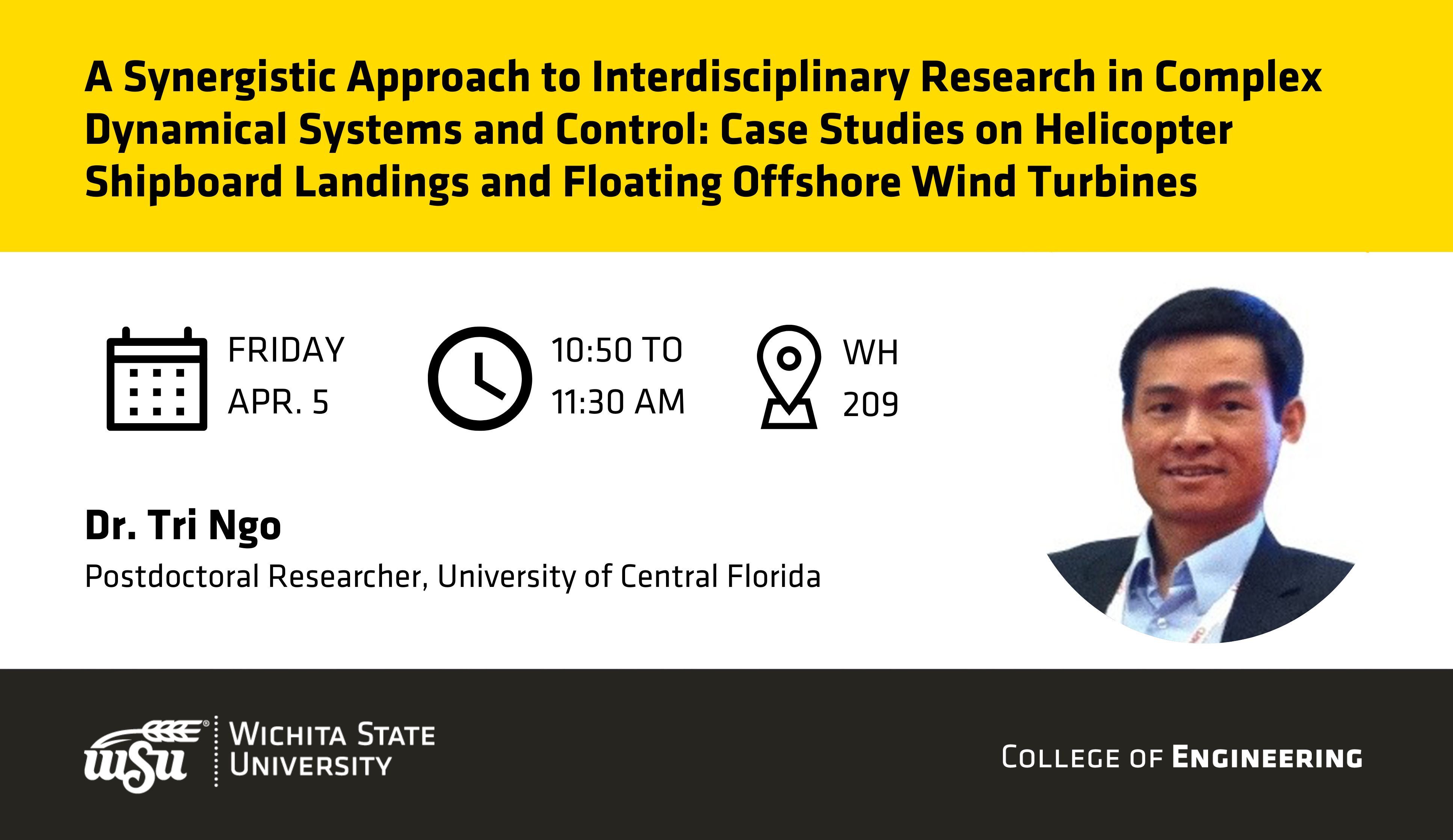
Time: Lecture from 10:50 to 11:30 AM
Location: Wallace Hall, Room 209
Featured Speaker: Dr. Tri Ngo, Postdoctoral Researcher, University of Central Florida
Attendees: All Wichita State University students, staff, faculty, alumni and industry partners are invited to attend.
Nanowired Human Cardiac Organoids for Heart Repair
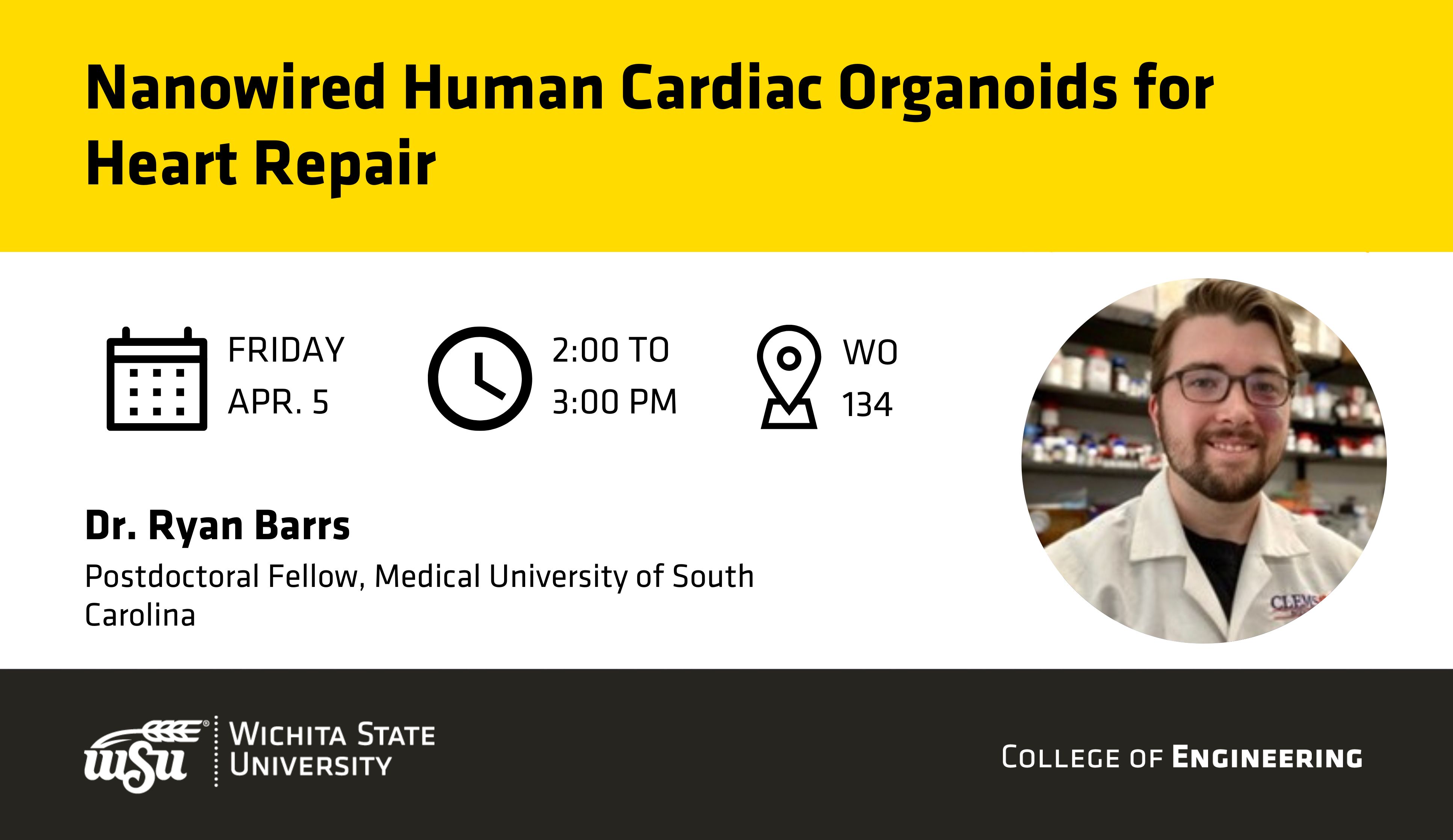
Time: Lecture from 2:00 to 3:00 PM
Location: Woosley Hall, Room 134
Featured Speaker: Dr. Ryan Barrs, Postdoctoral Fellow, Medical University of South Carolina
Attendees: All Wichita State University students, staff, faculty, alumni and industry partners are invited to attend.
Rapid and Energy Efficient Manufacturing of Polymer Composites for Aerospace Structures
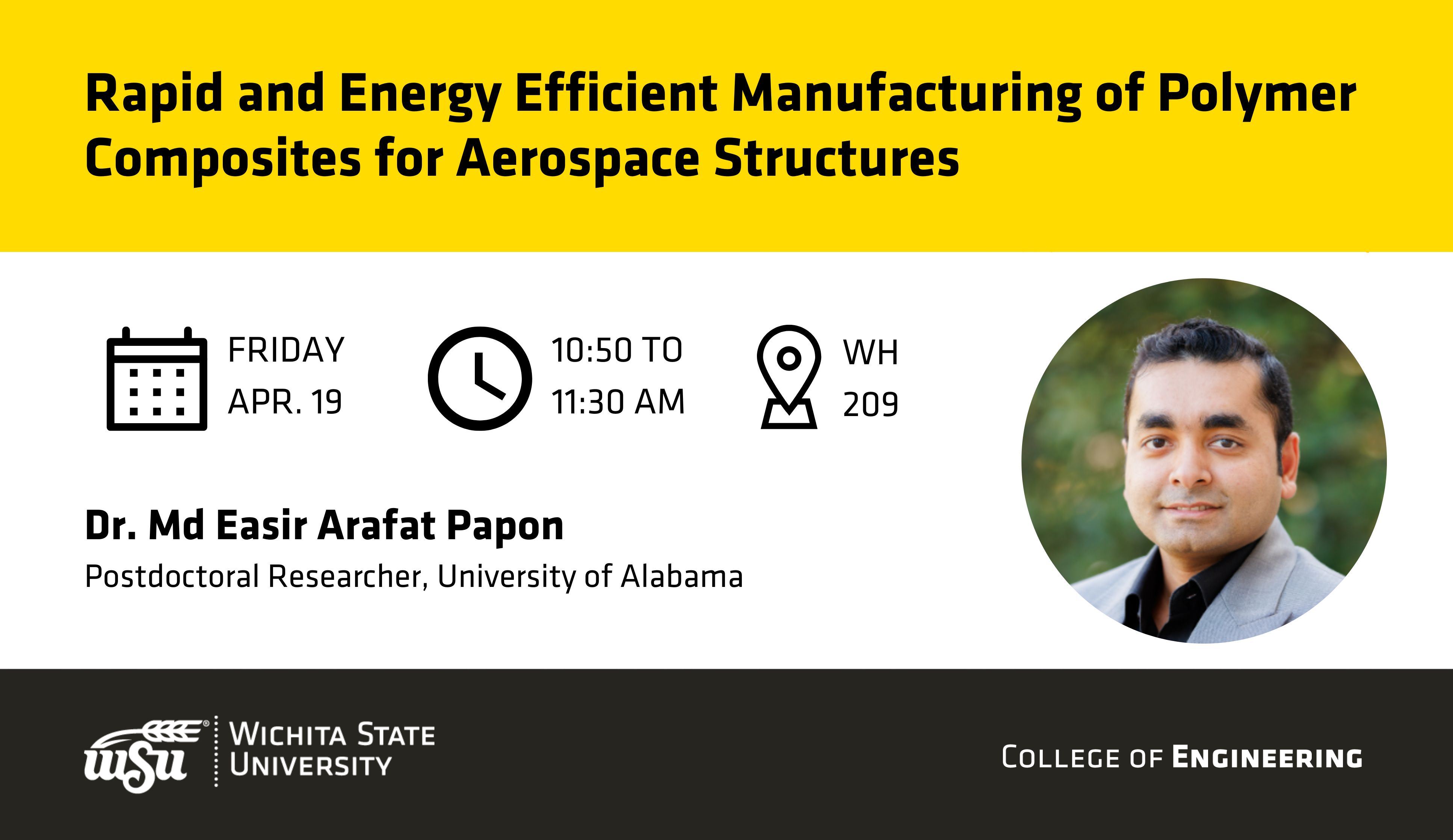
Time: Lecture from 10:50 to 11:30 AM
Location: Wallace Hall, Room 209
Featured Speaker: Dr. Md Easir Arafat Papon, Postdoctoral Researcher, University of Alabama
Attendees: All Wichita State University students, staff, faculty, alumni and industry partners are invited to attend.
Past 2023 Speaking Events
Generating Tissue-Mimetic Environments to Accelerate Next-Generation Therapies: A Journey from Academia to Entrepreneurship
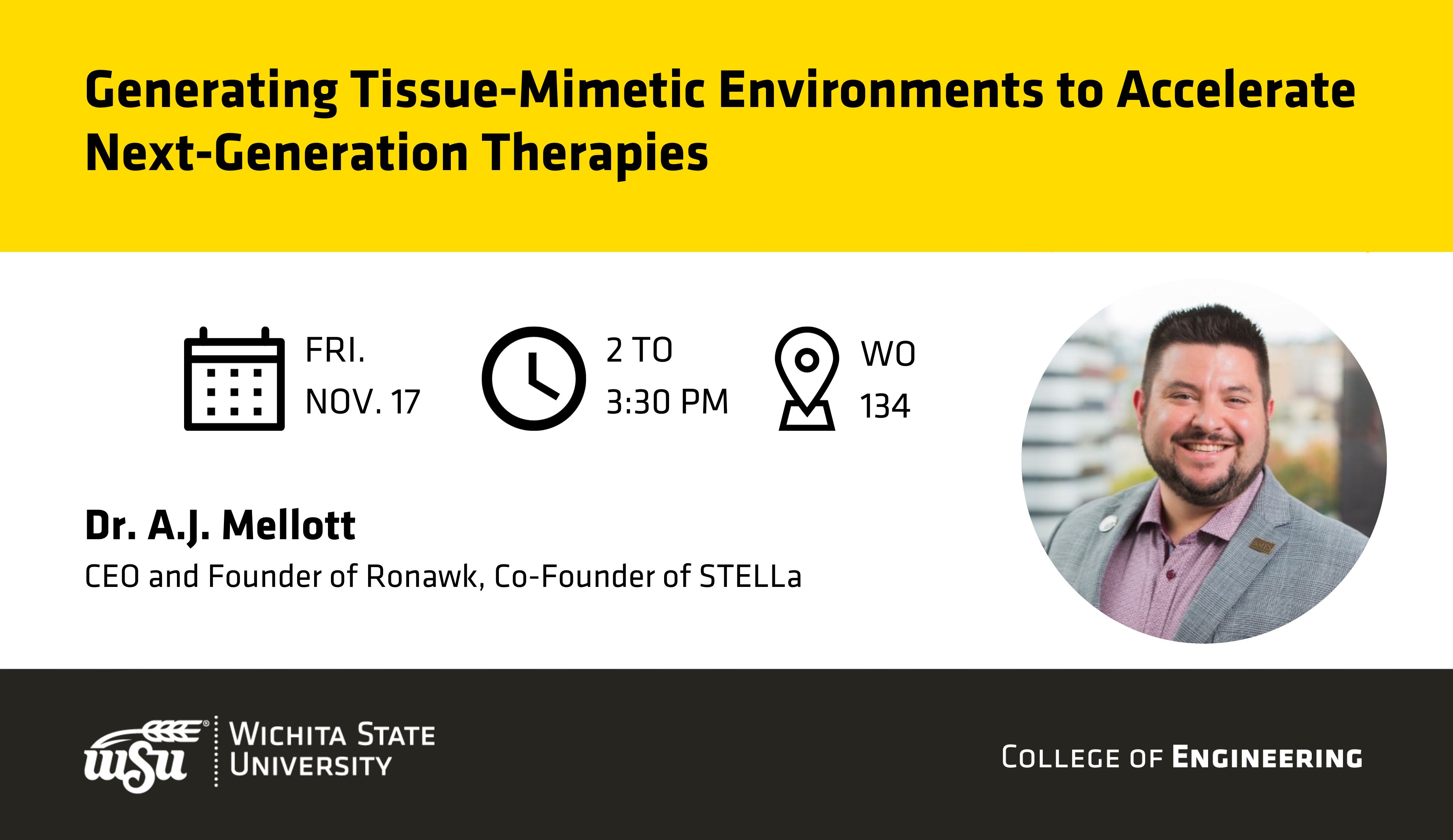
Time: Lecture from 2 to 3 pm, followed by refreshments and networking from 3 to 3:30 pm
Location: Woolsey Hall, Room 134
Featured Speaker: Dr. A.J. Mellott, the CEO of Overland Park-based biotechnology company, Ronawk
Attendees: All Wichita State University students, staff, faculty, alumni and industry partners are invited to attend.
Refreshments: Light refreshments will be served.
Getting Real About Leadership
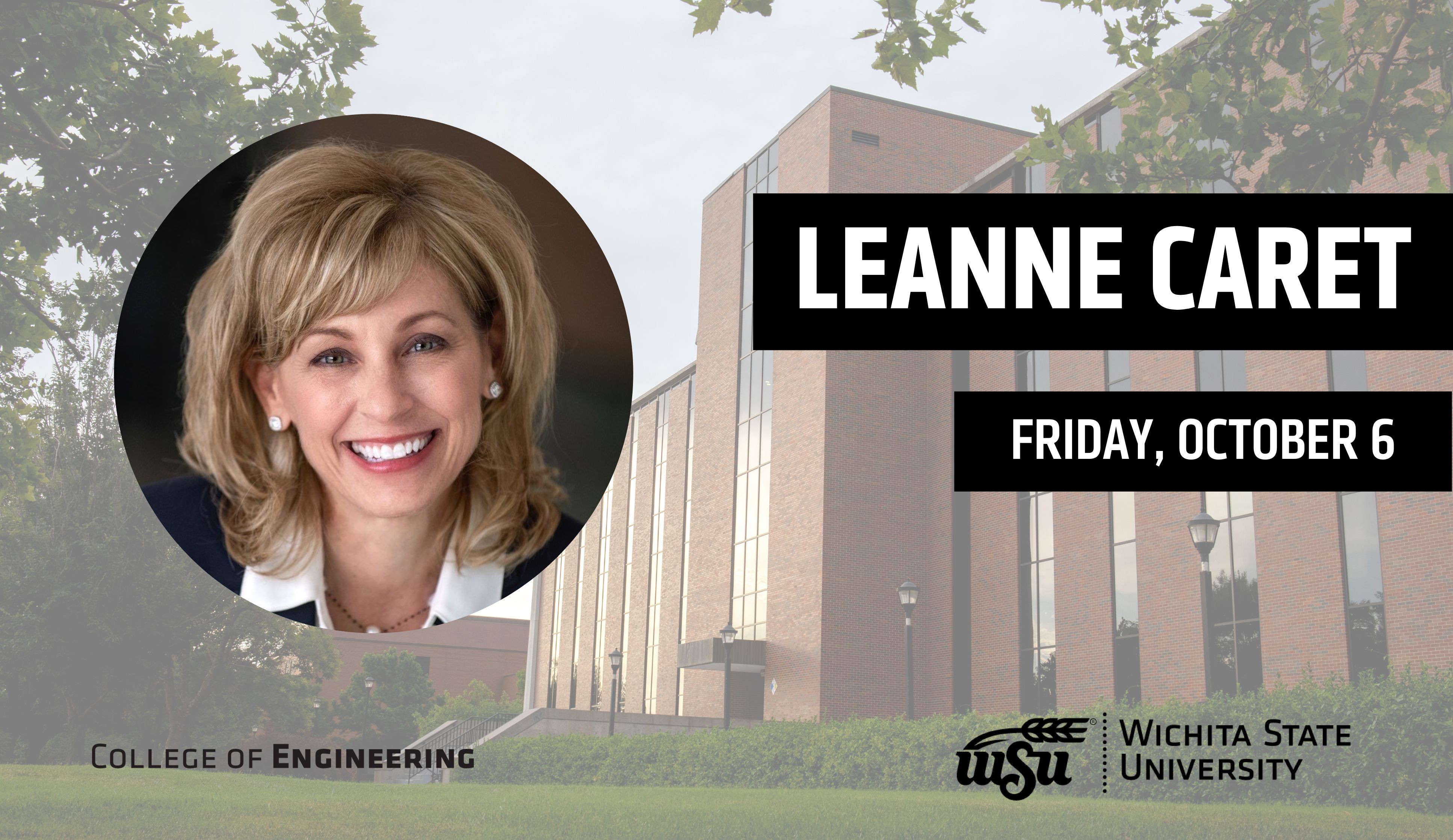
Location: Hubbard Hall, Room 209
Featured Speaker: Leanne Caret, Engineer in Residence for the College of Engineering, WSU alumna, former president and CEO of Boeing Defense, Space & Security (BDS)
Attendees: All Wichita State University students, staff, faculty, alumni and industry partners are invited to attend.
Refreshments: Light refreshments will be served.
The Promise and Peril of Intelligent, Creative Machines
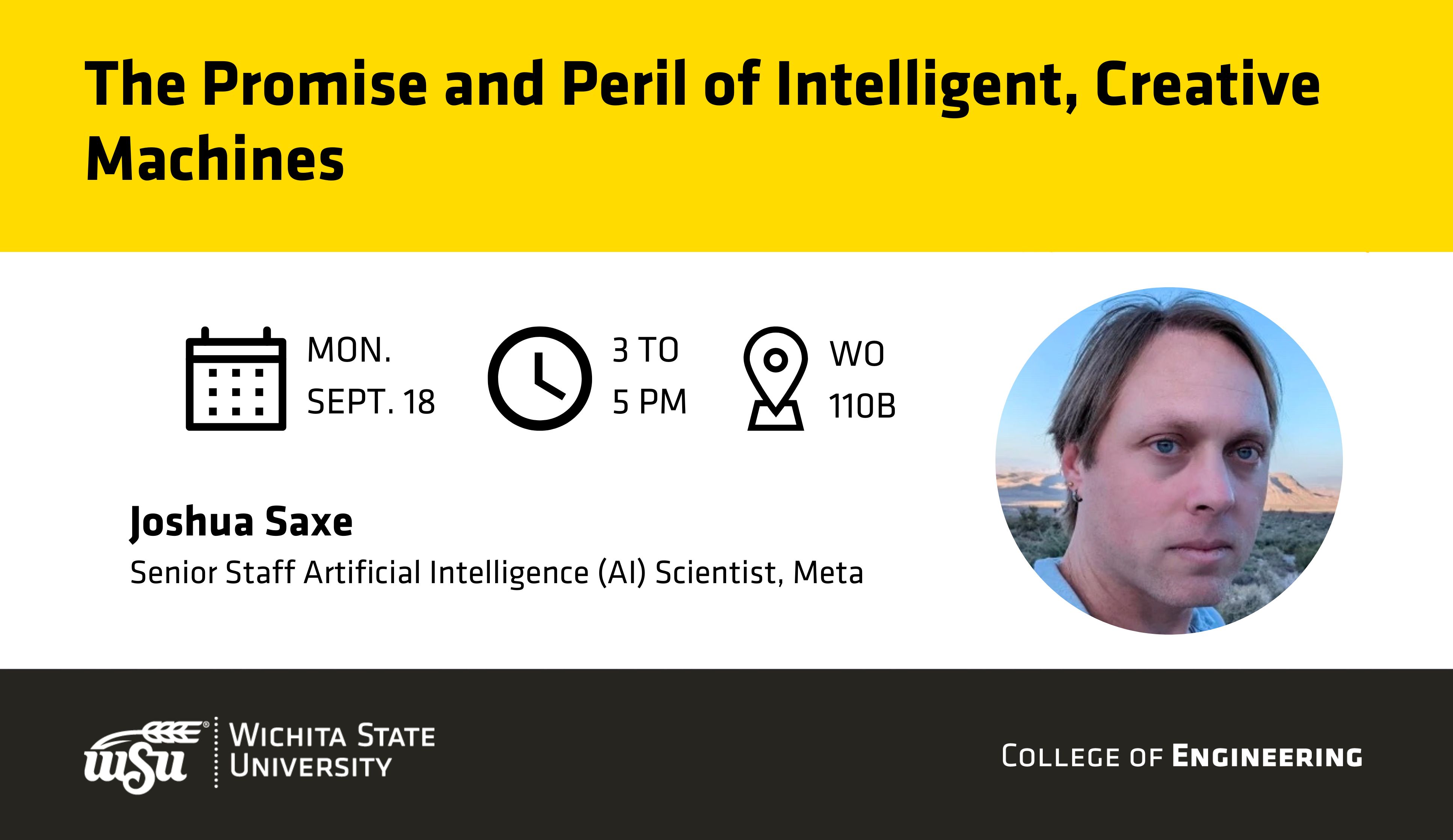
- Time: 3 pm to 4 pm (a 45-minute presentation featuring prepared remarks and accompanying PowerPoint slides, followed by a 45-minute moderated interview and Q&A session to address questions from the audience.)
- Location: Woolsey Hall, Room 110B (Auditorium 2)
- Featured Speaker: Joshua Saxe, Senior Staff Artificial Intelligence (AI) Scientist, Meta
- Abstract: In this 90-minute program tailored for the students and faculty of Wichita State University's College of Engineering, Joshua Saxe will provide an overview of contemporary AI technology. The presentation will encompass the origins of AI, the foundational mechanisms driving it, its present societal impacts including both risks and benefits, and projections of its future evolution. Joshua will draw on a comprehensive array of scientific and journalistic literature to assess the state of the field in a holistic manner. The opinions expressed in this talk are those of Joshua alone and do not represent those of his employer.
- Biography: Wichita-based computer scientist Joshua Saxe is a senior staff AI scientist at Meta, where he works at the intersection of generative AI, online safety, and cybersecurity. Prior to working at Meta, he was Chief Scientist at Sophos, a leading cybersecurity company, and Principal Investigator on multiple DARPA-funded cybersecurity AI research programs. He is the author of Malware Data Science: Attack Detection and Attribution, many peer-reviewed scientific publications, and holds more than 20 patents.
Advanced Materials for Sustainable Energy and Environment
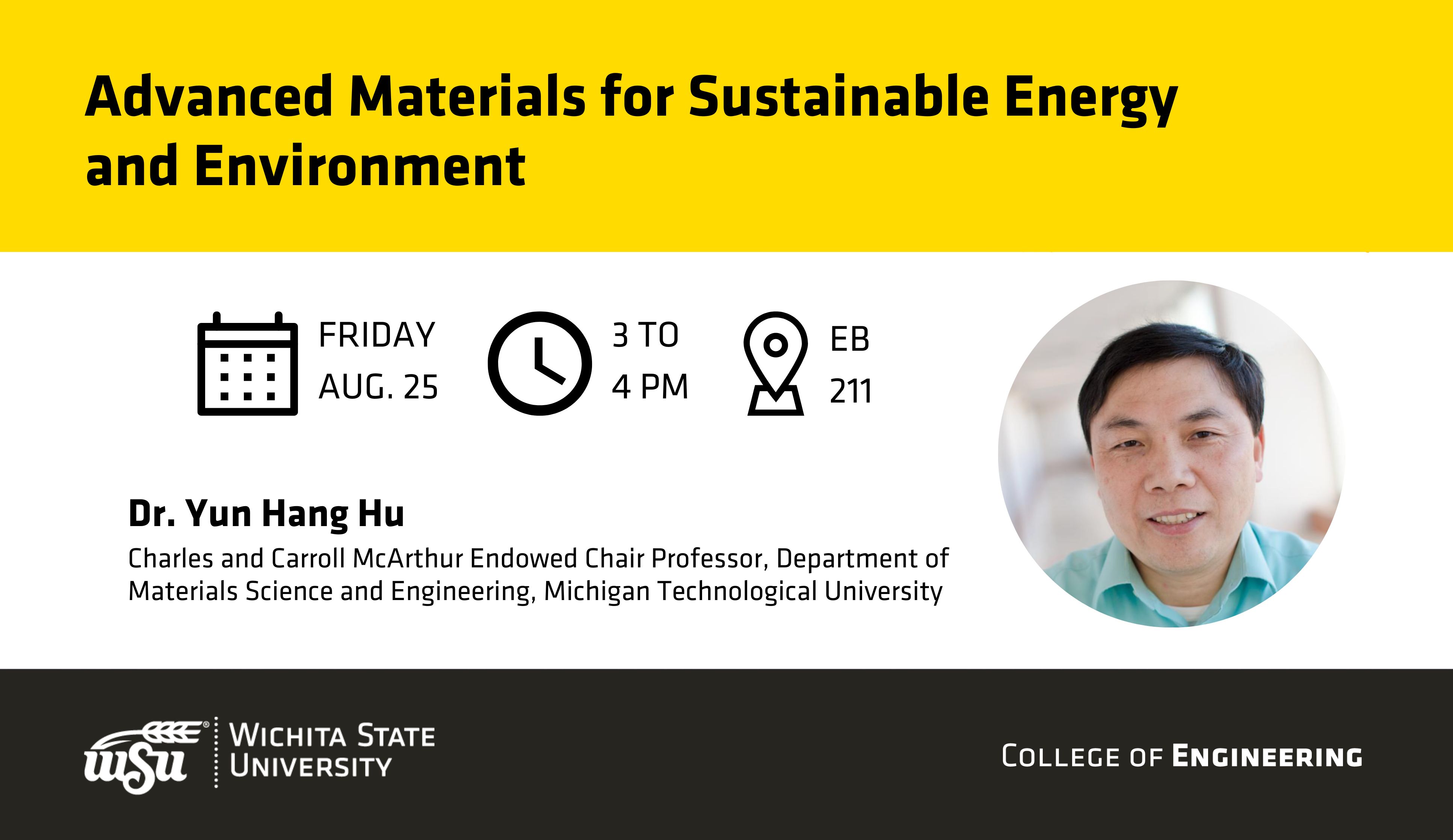
- Time: 3 pm to 4 pm
- Location: Engineering Building, Room 211
- Featured Speaker: Dr. Yun Hang Hu, Charles and Carroll McArthur Endowed Chair Professor, Department of Materials Science and Engineering, Michigan Technological University.
-
Abstract: Advanced materials play critical roles in the development of energy devices and the protection of environment. In recent years, Prof. Hu’s group has made great efforts to develop novel materials for sustainable energy and environment, including solar energy conversion and utilization, electrical energy storages, hydrogen production and storage, CO2 reduction, and the conversion of wastes to valuable materials. In this talk, he will discuss and highlight: (1) the design and synthesis of 3D graphene materials directly from CO2 and their application for solar cells, (2) the superstructured materials for fuel cells and supercapacitors, and (3) the advanced functional materials from fallen leaves and their applications as biodegradable plastics and photocatalysts.
- Biography: Dr. Yun Hang Hu is the inaugural Charles and Carroll McArthur Endowed Chair Professor at Michigan Technological University. He is fellows of the Canadian Academy of Engineering (CAE), the American Association for the Advancement of Science (AAAS), the American Chemical Society (ACS), the American Physical Society (APS), the American Institute of Chemical Engineers (AIChE), the ASM International (ASM), and the Royal Society of Chemistry (RSC, UK). He received the Rudolf A. Erren Award from the International Association for Hydrogen Energy (IAHE), ACS ChemLuminary Award, ACS ENFL Distinguished Service Award, and Michigan Tech Highest Research Award. He is the Editor-in-Chief of Energy Science & Engineering (a Wiley journal) and an editorial board member for 9 international journals (such as ACS Energy Letters). He was the chair of the ACS Energy and Fuels Division. He delivered more than 180 invited talks (including 55 plenary/keynote talks to national and international conferences) and published more than 300 papers in prestigious journals. His main research interests include nanomaterials and superstructured materials for energy and environments, energy devices (solar cells, batteries, supercapacitors, and fuel cells), hydrogen production and storage, CO2 and methane conversion, catalysis and photocatalysis, and conversion of wastes to valuable materials.
Enabling Structural Multi-Functionality Through Additive Manufacturing
- Time: 9 am to 10 am
- Location: Spirit Aerosystems
- Featured Speaker: Dr. Bhisham Sharma, Associate Professor, Aerospace Engineering, Wichita State University
- Abstract: Additive manufacturing methods allow for the realization of structural geometries and concepts that cannot be fabricated using traditional manufacturing techniques. Combining these methods with the intentional design of a structure’s underlying geometrical architecture can allow engineers to decouple previously interdependent properties and enable the design of multifunctional structures with mechanical and functional performance tailored to match specific application needs. In this talk, I will present an overview of our recent work exploring the development of novel structures for multifunctional applications, including the design of acoustic liners for aircraft noise reduction, the fabrication of thin hair-like fibers replicating feathers, airtight inflatable structures, and ceramic structures suitable for engineering applications.
Guaranteeing Safe Behavior for Real-World Control Systems
- Time: 11 a.m.
- Location: Engineering Building, Room 101
- Featured Speaker: Dr. Tamas Molnar
- Abstract:
Control and automation have reached the point where robotic systems and automated vehicles enter our everyday lives. In order to deploy these systems in the real world, however, strict requirements of safe operation must be met. Guaranteeing safe behavior on these systems may often be challenging, since they exhibit complicated, high-dimensional dynamics. Thus, the goal of this talk is to discuss how nonlinear control theory can be utilized to achieve provably safe behavior on real-world control systems like robotic systems and vehicles.
In this talk, I establish a control framework that endows real-world systems with formal safety guarantees when these systems are controlled based on simplified dynamical models. I address robustness to the discrepancies between the systems and their models, including disturbances and time delays. I implement this control framework on a wide variety of systems, such as legged, wheeled and flying robots, manipulators, aerial and ground vehicles, in both simulation and experiments. This work demonstrates the potential of nonlinear control theory to provide guaranteed safe behavior in real-world applications, that ultimately facilitates the widespread deployment of safe autonomous systems.
- Biography:
Tamas Molnar is a postdoctoral fellow at the Department of Mechanical and Civil Engineering, California Institute of Technology, Pasadena. Earlier, he held a postdoctoral position at the University of Michigan, Ann Arbor, between 2018 and 2020. He received PhD and MSc degrees in Mechanical Engineering and his BSc degree in Mechatronics Engineering in 2018, 2015 and 2013, respectively from the Budapest University of Technology and Economics, Hungary. His research interests include nonlinear dynamics and control, safety-critical control, and time delay systems with applications to connected automated vehicles and robotic systems.
Energy Seminar Series: Integrating Massive Amounts of Wind and Solar into Electric Power Systems
- Time: 3 p.m.
- Location: John Bardo Center, Room 264
- Featured Speaker: Ben Kroposki, PhD, PE, IEEE Fellow | Director – Power Systems Engineering Center | National Renewable Energy Laboratory
- Abstract:
Across the US, more states and electric utilities are setting 100% clean energy goals of which renewable technologies will be a major player. Variable renewable energy like wind and solar photovoltaics (PV) differ from conventional generation in that they use power electronic converters instead of synchronous generators to connect to electric power grids. At small levels, the power grid can easily handle the integration of variable renewable energy. At much higher levels, there are a number of technical concerns that must be addressed to ensure reliable and economic operations. This presentation will discuss the challenges and solutions to operating power system with high levels of variable renewables and how power electronic interfaces can be used to solve some of these challenges.
- Biography:
Dr. Ben Kroposki is the Director of the Power Systems Engineering Center at the National Renewable Energy Laboratory (NREL) where he leads NREL’s strategic research in the design, planning and operations of electrical power systems. He has over 30 years of experience in the design, testing, and integration of renewable and distributed power systems and has more than 150 publications in these areas with over 10,000 citations. Dr. Kroposki received his BSEE and MSEE from Virginia Tech and Ph.D. from the Colorado School of Mines. Dr. Kroposki is the recipient of the IEEE Power & Energy Society (PES) Ramakumar Family Renewable Energy Excellence Award which recognizes outstanding contributions in the field of developing, utilizing and integrating renewable energy resources in the national and global energy scenarios. As an IEEE Fellow, Dr. Kroposki was recognized for his leadership in renewable and distributed energy systems integration. Dr. Kroposki is also an Adjunct Professor at the Colorado School of Mines and University of Colorado and teaches courses on integrating renewable energy into power systems. Dr. Kroposki serves as the organizational director for the Universal interoperability for Grid-forming Inverters (UNIFI) consortium tackling the challenges with seamless integration of inverter-based resources and synchronous machines in all power systems.
Advanced Material Processing Techniques for Wettability Modification and Vehicle Lightweighting
- Time: 9:30 a.m.
- Location: Rhatigan Student Center, Room 262
- Featured Speaker: Avik Samanta, post doctorate research associate in the Applied Materials and Manufacturing group at Pacific Northwest National Laboratory (PNNL), Richland, Washington
- Abstract:
Advanced manufacturing methods have given rise to countless applications in diverse fields, such as aerospace, vehicle technology, energy harvesting, sensing, and decarbonization. Combining multiple functionalities in a single component increases complexity in fabrication and demands innovation in material processing. This talk includes two material processing techniques to modify material properties for specific applications. The first technique consists of a fast laser-based processing method for wettability modulation by controlling the surface structures and chemistry. It leads to various extreme wettabilities, including superhydrophobicity, superhydrophilicity, superwicking, and wettability patterning. We have used the textured surface to enhance catalytic activity, anti-icing capability, and corrosion resistance. The second technique incorporates solid-state friction stir processing (FSP). This thermomechanical processing tool is applied on high-pressure die-cast (HPDC) Al-alloys. HPDC Al-alloys are increasingly used in vehicle structural components for glider weight reduction and part unitizing to achieve greater fuel efficiency and lower carbon emission. FSP-driven microstructure modification results in enhanced yield strength, ductility, fatigue life, and fracture toughness, suggesting the possible scope of lightweighting for vehicles.
Lecture on “Stress Transformations and Mohr’s Circles” to follow seminar.
- Biography:
Avik Samanta is a Post Doctorate Research Associate in the Applied Materials and Manufacturing group at Pacific Northwest National Laboratory (PNNL), Richland, Washington, USA. His research interest encompasses the advanced manufacturing of metal and metal alloys, semiconductor materials, catalysts, and metamaterials, through laser-based surface engineering, solid-state processing, and additive manufacturing. In addition, his research focuses on developing novel processing methods and understanding the fundamentals to contribute towards reducing carbon emissions and improving energy efficiency. He received his doctoral degree in Mechanical Engineering from the University of Iowa, Iowa City, Iowa, USA, in 2020. He is the recipient of the outstanding teaching assistant award, the RSN Planjery research award, and the graduate college research fellowship during his doctoral degree at the University of Iowa. He received his bachelor's and master's degree with honors from the Jadavpur University, Kolkata, and the Indian Institute of Technology Bombay, Mumbai, respectively. He was also associated with Taiwan Semiconductor Manufacturing Company in Hsinchu, Taiwan as a product engineer before his doctoral study, where he was awarded the outstanding engineer award.
Cradle-to-Grave Digital Thread—Challenges and Solutions
- Time: 5:30 p.m.
- Location: Woolsey Hall, Room 323
- Featured Speaker: Dr. Maciej Zawodniok, an associate professor from Missouri University of Science and Technology
- Abstract:
Modern manufacturing industry increasingly depends on digital domain for delivering high quality, economically viable, and technologically advanced products. Moreover, for safety critical applications, for example aircraft construction and maintenance, both the components and the manufacturing process must meet high quality requirements with appropriate documentation. Digital Thread refers to process of collection and processing of such data, whereas a particular component digital data portfolio is called a Digital Twin. There are many anticipated benefits of using Digital Thread and Digital Twin including: (a) automation of data collection, (b) ability to analyze and optimize manufacturing processes, (c) reduce time-consuming and costly certifications of processes and parts, (d) actual, individualized part usage history, tracking, and maintenance, (e) ability to refurbish or build individual replacement component that is no longer mas-produced, etc.
However, there are also many challenges that need to be addressed to realize these benefits. The challenges developing new technologies including tracking of components throughout the manufacturing and supply chains, distributed data storage and management, linking data items from various manufacturing stages into one, complete digital twin. In this talk, the overview of the Digital Thread framework is discussed in context of potential use cases and challenges. Also, the solutions for automated data collection and component localization and tracking will be presented including edge-device (LIMS Box) and passive RFID based tracking and 3D localization technique.
- Biography:
Dr. Maciej Zawodniok is an Associate Professor, Missouri University of Science and Technology (2014-Present). Dr. Zawodniok received PhD in Computer Engineering, Missouri University of Science and Technology in 2006. He has been awarded a prestigious NSF CAREER award on enhancing performance of Radio Frequency Identification (RFID) based network. He co-authored over 30 journal publications, two book chapters, and over 35 conferences. He is Senior Member of IEEE. He has graduated 8 PhD and 13 MS students. Currently he is leading projects on cyber-infrastructure for digital manufacturing and sensor fusion for air traffic control. He is participating in development of an RFID-based maintenance system. He was a lead investigator of an Embedded Systems and Networking Thrust in the ARL funded LoTrExWiSeNet project with a focus on localization and embedded sensing platform. Dr. Zawodniok has implemented control schemes for various real-time systems including embedded firmware for robot-supported inspection of aircraft components for Boeing Co., HVAC system controller for Verde GSE company. Moreover, he published multiple papers on developing communication schemes and protocols for sensor and control systems. His work on design and analysis of resilient, networked control system utilizes statistical analysis to prove guarantee of convergence and performance in the presence of stochastic communication network.
Development of Oral Solid Dosage Forms
- Time: 10:30 a.m.
- Location: Woolsey Hall, Room 134
- Description: The Department of Biomedical Engineering within the College of Engineering hosted Dr. Theresa Locascio and Dr. Jonathan Ashley, scientists from Catalent Pharma Solutions, for a virtual talk.
Q&A with Leanne Caret: How to Navigate Your Way to the Top
- Time: 10 a.m. to 11:30 a.m.
- Location: Rhatigan Student Center, Room 301
- Featured Speaker: Leanne Caret, Engineer in Residence for the College of Engineering, WSU alumna, former president and CEO of Boeing Defense, Space & Security (BDS)
- Host: Dr. Anthony Muscat, Dean of the College of Engineering
- Attendees: All Wichita State University students, staff, faculty, alumni and industry partners were invited to attend.
A Conversation With Leanne Caret
- Time: 4 to 5 p.m.
- Location: Jabara Hall, Room 128
- Featured Speaker: Leanne Caret, Engineer in Residence for the College of Engineering, WSU alumna, former president and CEO of Boeing Defense, Space & Security (BDS)
- Host: Grace Peterson, a junior mechanical engineering major and president of the Society of Women Engineers (SWE) at WSU
- Attendees: All Wichita State University students, staff, faculty, alumni and industry partners were invited to attend.
Prediction of Aerothermodynamic Loading and Flight Control Using Energy
- Time: 10:15 a.m.
- Location: Wallace Hall, Room 209
- Featured Speaker: Dr. Nadia Kianvashrad, Post-Doctoral Associate, Rutgers State University of New Jersey
Intelligent Wireless Systems: From Human Sensing to Object Detection
- Time: 10:30 a.m.
- Location: Jabara Hall, Room 260
- Featured Speaker: Yili Ren, Doctoral Candidate, Department of Computer Science, Florida State University
- Abstract:
Recently, the prevalence of wireless devices and ubiquitous coverage of wireless networks provide us with the opportunity to extend the capabilities of wireless signals from communication to sensing humans and objects in the physical world. In this talk, I will present our work in building intelligent wireless systems that leverage a novel WiFi vision approach and deep learning to enable various human-computer interaction (HCI), Internet of Things (IoT) as well as security monitoring applications. In particular, the WiFi vision approach could generate a visualization of the signal reflections from the surrounding environment, thus providing the ability for wireless devices to "see" a person in the physical world as we humans do. Deep learning techniques are utilized to extract both spatial and temporal information in the WiFi vision to digitize the human body. Therefore, we can achieve 3D human pose estimation, 3D human mesh construction, as well as person re-identification using wireless signals. In addition, we extend human sensing to object sensing. Specifically, we design a wireless signal-based liquid level sensing system for household containers that can be easily integrated with existing smart home networks and can support various smart home applications. - Biography:
Yili Ren is a Ph.D. candidate in the Department of Computer Science at Florida State University. Previously, he received his M.S. degree from the School of Electronics and Information Engineering at Beihang University in 2017. His research interest focuses on mobile computing with an emphasis on integrating the sensing capabilities of wireless and mobile devices to build new classes of Internet of Things (IoT) and smart home applications, enable novel technologies for human-computer interaction (HCI), as well as improve smart home and IoT security. His work has been published at top-tier mobile computing, computer security, and human-computer interaction venues, including ACM SenSys, USENIX Security, and ACM IMWUT (UbiComp). He received the Outstanding Undergraduate Student Award in Henan Province and Graduate Student Merit Scholarship at Beihang University. Most recently, he received the Graduate Student Research Award in the Department of Computer Science at Florida State University.
Reliable Uncertainty Characterization for Space Sustainability and Safety
- Time: 10:15 a.m.
- Location: Wallace Hall, Room 209
- Featured Speaker: Smriti Nandan Paul, Ph.D., Post-Doctoral Research Fellow, West Virginia University
- Abstract:
Safety of the near-Earth space environment, where we have many assets like communication and reconnaissance satellites, the International Space Station (ISS), space-based optical sensors, and others, is an ever-increasing concern because of the exploding number of satellite launches. Kessler's Syndrome, or the cascading phenomenon in which space debris collisions create more debris and collisions, could make this valuable near-Earth space inaccessible. In order to protect valuable space assets, we must have good space situational awareness (SSA) and space traffic management (STM) measures in place. This seminar focuses on the topic of stochastic machine learning techniques for SSA, STM, and space weather applications in low Earth orbit (LEO). The topic will cover the effect of uncertainty in atmospheric drag parameters on orbital perturbations under various space weather conditions. Uncertainties in drag parameters are the largest sources of dynamical uncertainties for objects in the LEO region and are particularly important during geomagnetic storms. Reliable uncertainty characterization affects important SSA/STM tasks such as the sensor tasking (important for catalog maintenance and discovery of untracked space objects) and probability of collision computation (important for collision avoidance maneuvers). - Biography:
Smriti Nandan Paul is a post-doctoral research fellow at West Virginia University (WVU). His research interests lie at the intersection of astrodynamics, space situational awareness (SSA), space traffic management (STM), space weather, and applications of machine learning techniques in SSA/STM/space weather. Paul earned his Dual Degree in Aerospace Engineering from IIT Bombay and his Ph.D. in Aerospace Engineering from the School of Aeronautics and Astronautics, Purdue University. He is the recipient of the Purdue AAE Teaching Scholarship 2019, AAE Teaching Fellowship 2020, and AAE Teaching Assistant Award 2019. Before his current position at WVU, he was a Visiting Assistant Professor at Purdue University. His internship experience in the aerospace industry includes Planet Labs (Attitude Determination and Control System Team) and IN Space LLC (Space Debris Re-entry Policy Analyst).
High-Order Numerical Methods and Hybrid Turbulence Modeling for High-Speed Compressible Flows
- Time: 10:15 a.m.
- Location: Wallace Hall, Room 209
- Featured Speaker: Mustafa Engin Danis, Doctoral Candidate in Applied Mathematics and Aerospace Engineering, Iowa State University
The Value Proposition of Skillset Match
- Time: 9:30 a.m.
- Location: John Bardo Center, EE 264
- Featured Speaker: Lee R. Lambert, a founder of PMP®
- Abstract:
Did you ever wonder how someone in the business of project management could possibly be so far off when they compare their estimates with the actual performance data? Did the same person who estimated the project execute the project or did an SME provide the estimate but an SMO actually did the work? What is the impact of what has come to be known as "bait and switch" on the project management information used to drive project critical project decisions? I will show you how to calculate the impact on time and cost associated with "bait and switch."
Engineered Metastatic Niches: Heterogeneity and Diagnostic Value
- Time: 3:30 p.m.
- Location: Jabara Hall, Room 128
- Featured Speaker: Sophia Orbach, Ph.D., Post-Doctoral Associate, University of Michigan
- Abstract:
One in eight women will be diagnosed with breast cancer in their lifetime. Advances in early screening and medical technologies have drastically enhanced survival in local disease, yet metastatic breast cancer continues to have poor outcomes. Improving metastatic diagnostics may be the key to improving survival. We have developed a porous, biomaterial scaffold that, when implanted subcutaneously, acts as an engineered metastatic niche. This scaffold provides a designated, accessible site that can be sampled to study disease biology and progression and serve as a diagnostic for early metastatic disease. - Biography:
Sophia Orbach is a postdoc in the Department of Biomedical Engineering at the University of Michigan. Her current research, under the guidance of Professor Lonnie Shea, centers on the use of biomaterial implants as synthetic metastatic niches. This research was funded through awards from the NIH F32 Postdoctoral Fellowship and University of Michigan Postdoctoral Translational Scholar Program. Dr. Orbach earned her B.S.E. in Chemical Engineering from the University of Michigan and her M.Eng. and Ph.D. in Chemical Engineering from Virginia Tech. Her doctoral research focused on application of engineered liver models in toxicity and fibrosis.
Towards Autonomous Malware Deception and Orchestration Using Advanced Dynamic Malware Analysis and Data Analytics
- Time: 10:30 a.m.
- Location: Jabara Hall, 260
- Featured Speaker: Md Sajidul Islam Sajid, Research Assistant, The University of North Carolina at Charlotte
- Abstract:
The traditional approach to cyber defense has proven to be insufficient, as attackers have the advantage of identifying targets and launching covert attacks. While the defender must patch all system vulnerabilities, the adversary must find only one exploit to abuse. Active Cyber Deception (ACD) has emerged as effective means to reverse this asymmetry by dynamically orchestrating the cyber deception environment to mislead attackers and corrupt their decision-making process. However, creating an efficient ACD system requires human expertise and in-depth malware analysis to understand attack behaviors. Automated understanding and deployment of deception systems face several key challenges, such as advanced dynamic malware analysis that is time-intensive and resource-demanding, manual identification of malware behaviors that are not scalable, and the existing deception methods that lack agility, robustness, and automation. My research addresses these shortcomings by developing solutions that include a comprehensive dynamic malware analysis agent that performs optimal symbolic execution without running into path explosion problems, an extracting agent that extracts deception parameters and Malicious Sub-graphs (MSGs) from real-world malware and maps them to MITRE ATT&CK techniques utilizing natural language processing, an orchestration engine that provides deception as a service and orchestrates a deceptive environment at runtime utilizing API hooking and/or HoneyThings.
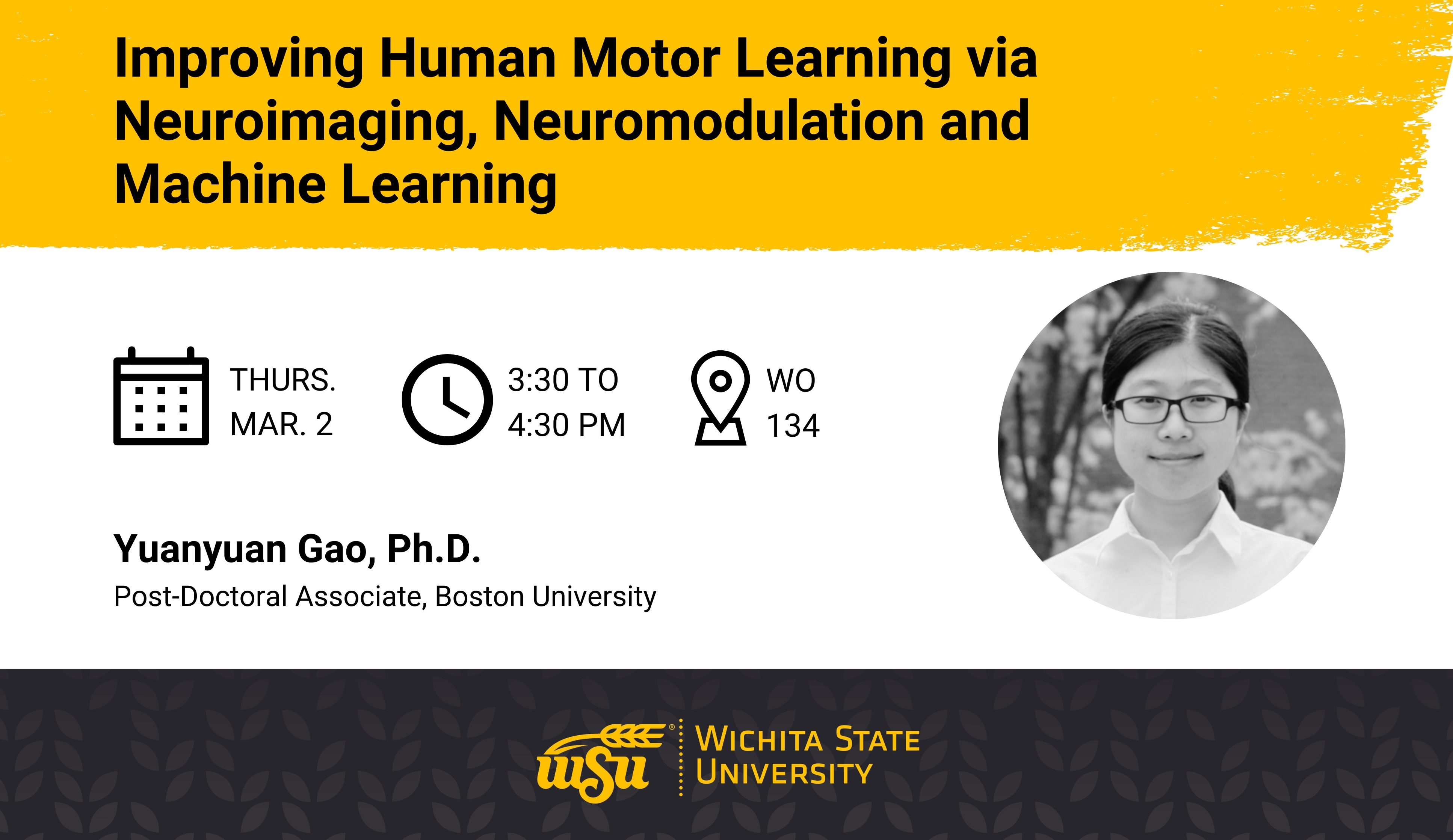
Improving Human Motor Learning via Neuroimaging, Neuromodulation and Machine Learning
- Time: Seminar from 3:30 to 4:30 p.m. | Students Meet With Dr. Gao from 4:30 to 5 p.m.
- Location: Woolsey Hall, Room 134
- Featured Speaker: Dr. Yuanyuan Gao
- Abstract:
Motor performance is essential to the daily life of humans. The improvement of fine motor skills is critical in numerous fields, such as motor rehabilitation and skill-based training, as seen in stroke patients, athletics, aviation, driving, or surgery. We aim to improve motor skills using neuroimaging to monitor, neuromodulation to intervene and machine learning to model the brain activation. First, we investigated the potential of transcranial electrical stimulation (tES) in improving bimanual surgical skills (Fig. A). We performed a series of human subject studies to explore the effects of tES on the surgical task while monitoring by functional near-infrared spectroscopy (fNIRS). We found that transcranial direct current stimulation (tDCS) improves long-term skill acquisition in decreasing surgical error. The concurrently acquired fNIRS data, while medical students performed the surgical task, elucidated a correlation between cortical activations as reported by fNIRS with tES excitation and improved performance. Second, we explored the possibility of emulating the current standardized skill assessment metrics in a surgical motor task. To achieve this, a neural network structure, Brain-NET (Fig. B), was developed to extract information from fNIRS data acquired during the task execution for potentially fast and bedside implementation. Lastly, to further solve the problem of motion artifacts induced in this surgical task, we employed the denoising autoencoder (DAE) model (Fig. C) to remove the motion artifacts. This approach improved and speeded up the fNIRS data preprocessing workflow toward enabling real-time implementation. - Biography:
Dr. Yuanyuan Gao gained her bachelor’s and master’s degrees in Engineering at Beihang University, and her Ph.D. degree at Rensselaer Polytechnic Institute in New York State. She studied the effects of neuromodulation on human motor behaviors using functional near-infrared spectroscopy for her Ph.D. research and has published numerous papers in journals such as IEEE TBME, frontiers in Neuroscience and Neurophotonics. After her Ph.D., she became a postdoctoral fellow at Boston University to pursue her research interests in advanced neuroimaging technologies in Dr. David Boas’ lab. Her research interests include human motor learning, neuroimaging, functional near-infrared spectroscopy, neuromodulation, and machine learning.
Biobatteries and Diagnostic Platforms for Point-of-Care Testing Needs
- Time: 11 a.m.
- Location: Woolsey Hall, Room 134
- Featured Speaker: Arwa Fraiwan, Ph.D., Senior Research Associate, Case Western Reserve University
- Abstract:
Disposable lab-on-a-chip (LOC) devices recently emerged as a new paradigm for clinical diagnostics. These devices incorporate advanced micro-sized biosensors and microfluidics, which require small reagent volume and minimized power consumption. Thus enabling effective and rapid point-of-care (POC) testing even in challenging field conditions. A key challenge is to develop miniaturized power sources for operating those POC devices in resource-limited settings.
In this seminar, I will present my main research projects in two parts. First, I will overview several paper-based bacteria-powered batteries that I developed during my doctoral studies in an effort to develop efficient paper-based biobatteries using micro-sized microbial fuel cells. Second, I will introduce the design, development, manufacturing and clinical validation of a novel POC hemoglobin test, HemeChip, a paper-based, microchip electrophoresis technology developed at CWRU and commercialized globally as GazelleTM. The technology currently tests for sickle cell disease and beta thalassemia. Future tests include anemia, diabetes and COVID-19. Finally, I will describe my future research and teaching visions.
- Biography:
Dr. Arwa Fraiwan is a senior research associate in the Biomanufacturing and Microfabrication Laboratory in the Mechanical and Aerospace Engineering Department at Case Western Reserve University. She received her Ph.D. in electrical engineering from Binghamton University. To date, she has co-authored 43 publications in high-impact peer-reviewed journals and refereed conference proceedings. She is a co-inventor on three US patents and two more pending. Her research interests include BioMEMS, biofuel cells, biosensors, POC diagnostics and mHealth.
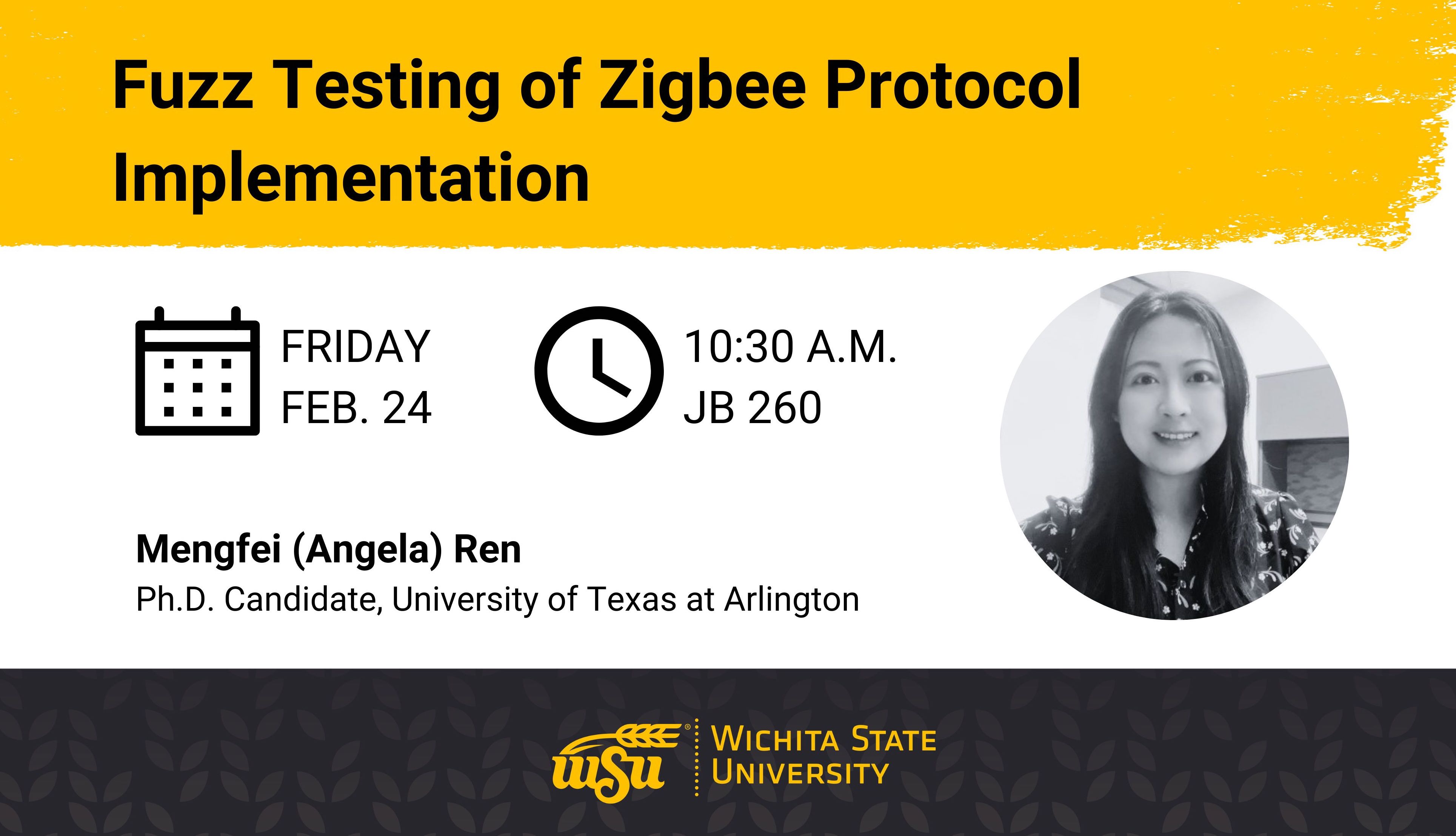
Fuzz Testing of Zigbee Protocol Implementation
- Time: 10:30 a.m.
- Location: Jabara Hall, Room 260
- Featured Speaker: Mengfei (Angela) Ren, a PhD candidate from the University of Texas
- Abstract:
In recent years, we have witnessed the proliferation of the Internet of Things (IoT) devices widely adopted by various areas, such as home automation, healthcare, industry and smart vehicles. Globally, Zigbee is one of the most popular IoT wireless standards used by millions of devices and customers like Amazon, Samsung, IKEA, Xiaomi, and so on. This rapid global market growth of Zigbee also incentivizes cybercriminal attacks. Therefore, it is necessary and practical to detect security issues in the Zigbee protocol. In this talk, I will present the current state-of-the-art security analysis solutions for the Zigbee protocol. Then I will introduce my research work on fuzz testing of Zigbee protocol implementations. This includes a device-agnostic fuzzing framework of Zigbee protocol implementation and an intelligent Zigbee protocol fuzzing solution via constraint-field dependency inference. Finally, I will present some ideas for my future work on multiple field mutation for fuzzing and silent memory detection in the Zigbee protocol using advanced software testing techniques. - Biography:
Mengfei (Angela) Ren is currently a Ph.D. ABD in the Department of Computer Science and Engineering at the University of Texas at Arlington. She is advised by Dr. Jeff Lei at UT Arlington and Dr. Jiang Ming at Tulane University. Her research interests lie at the intersection of cybersecurity and software engineering. Her Ph.D. thesis focuses on combining practical software testing techniques to detect security vulnerabilities in IoT wireless protocols. Her work has detected several critical vulnerabilities in a mainstream Zigbee protocol stack. She was the recipient of UTA CSE Cyneta Networks Outstanding Graduate GTA.
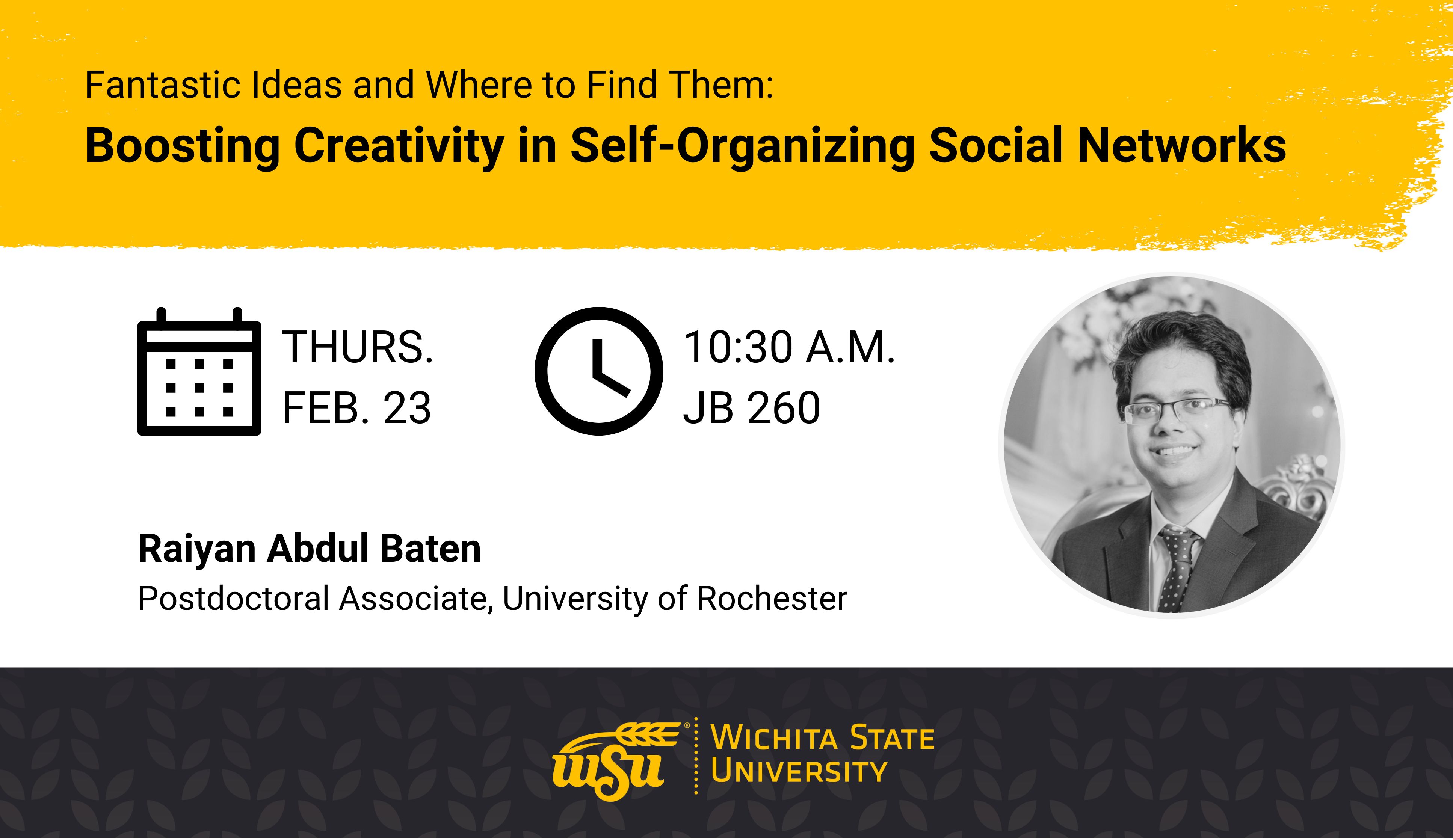
Fantastic Ideas and Where to Find Them: Boosting Creativity in Self-organizing Social Networks
- Time: 10:30 a.m.
- Location: Jabara Hall, Room 260
- Featured Speaker: Raiyan Abdul Baten, University of Rochester
- Abstract:
Socio-cognitive soft skills such as creativity, leadership, storytelling, debate, teamwork, and negotiation are vital for the future of work. Moreover, teams increasingly rely on online interaction platforms to navigate remote work. Elevating people’s soft skills and performance outcomes at scale, particularly in online interaction settings, is one of the aspirational challenges of our time.
In this talk, I will focus on creativity—the most critical soft skill of the future. In particular, I will discuss how social interactions may affect the novelty of our ideas (or the lack thereof). Through the lens of our randomized experiments, I will explain how a social network’s connections and creative outcomes co-evolve in response to its members’ ideation performance, popularity, and identity attributes. I will touch on our modeling of the empirical insights (i.e., using agent-based, game-theoretic, deep neural, and statistical network models) and the validation approaches (i.e., in a real-life academic dataset). Bringing the findings together, I will discuss how AI-, HCI-, and policy-driven solutions can help boost people’s creative performances in a social network. I will conclude with my envisioned lines of work toward enhancing the soft skills and collective performances of humans, as well as combating belief polarization in online social platforms
- Biography:
Raiyan Abdul Baten is a postdoctoral associate in the Department of Computer Science at the University of Rochester, advised by Dr. Ehsan Hoque. His research focuses on building technology for enhancing the soft skills and collective performances of humans. In doing so, he brings methods and materials from computer science, social science, psychology, network science, and cognitive science together. His work has been published in PNAS Nexus, Nature Scientific Reports, Royal Society Interface, and other reputed venues. He received his Ph.D. and master’s degrees from the University of Rochester, respectively in 2022 and 2018, and his bachelor’s degree from Bangladesh University of Engineering and Technology in 2016.



